

LoCEL-H2, a four-year initiative, is bringing innovative energy solutions to remote communities in Africa. In this interview, Dr. Athanasia-Maria Tompolidi, CBI's Research & Innovation Manager, discusses the project's goals, technological innovations, and commitment to community empowerment.
Let's start with the basics. Can you tell us what the LoCEL-H2 project is about and what it aims to achieve?
Of course. LoCEL-H2 is an innovative, four-year project under Horizon Europe that kicked-off in January 2023. It aims to bring scalable microgrid systems to isolated communities. These communities often lack steady access to energy like electricity and clean cooking facilities, which is taken for granted in the developed countries.
We combine solar power, advanced lead battery systems, and green hydrogen technology to offer sustainable and affordable energy solutions. And it is not just about technology. Empowering women in these communities is a big part of our project, especially in places like Zambia and Ivory Coast. We have an amazing team of partners from all over the globe, bringing diverse expertise to the table.
In a world teeming with green innovations and an urgent need for sustainable solutions, what sets LoCEL-H2 apart from the crowd, and why is it particularly crucial now?
LoCEL-H2 uniquely intertwines new technology with Social Sciences and Humanities (SSH) insights, hitting that crucial spot where technical solutions meet community needs head-on. We are in sync with the EU's hydrogen strategy and REPowerEU plan, introducing innovative ways for decarbonisation and independence from fossil fuels. By introducing green hydrogen solutions in developing countries, LoCEL-H2 contributes to global decarbonisation efforts and supports the European Green Deal's objectives.
Given the challenges posed by climate change, especially for vulnerable countries, projects like LoCEL-H2 provide essential tools for Climate Adaptation. It addresses critical issues such as food security, water supply, education, disasters risk reduction and public health.
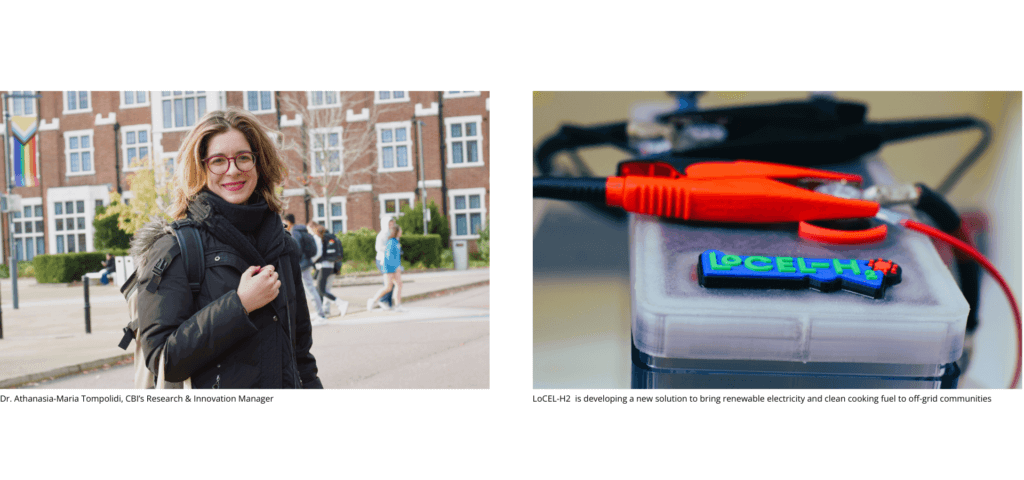
From sunlight to energy storage
Innovation is key to the project. Could you explain how green hydrogen and advanced lead batteries work and why they're game-changers?
LoCEL-H2 stands on three innovation pillars. The first is a scalable, plug-and-play microgrid that uses solar energy to power communities. The second is a battery energy storage system tailored for households, small businesses, and community infrastructures to ensure a steady energy supply. The highlight is our community-shared battery-electrolyser, a novel system for energy storage and green hydrogen production.
Our vision with LoCEL-H2 is simple: we want to re-power the communities, quite literally. These smart innovations contribute to tackling energy poverty and provide sustainable solutions for those lacking access to reliable energy.
Could you give us an update on how the project is progressing and any significant milestones you've hit so far?
This past year has been remarkable. LoCEL-H2 has made significant progress thanks to our team's hard work and collaboration. We have mapped out stakeholder databases across continents. Our team has visited African and Pakistani villages to learn more about the communities and their energy needs. Key technical milestones of the project include the strategic design of our battery-electrolyser and advancements in energy storage solutions.
Our team has been meeting regularly, both online and in person, to ensure we stay on track. We had a face-to-face General Assembly in Naples in the autumn of 2023 and are looking forward to the upcoming one in Brilon, Germany, in the spring of 2024. It is very reviving to keep the in-person interaction.
Communities thriving on clean energy
Everyone's excited to see results. What are the short-term and long-term benefits LoCEL-H2 brings to the table?
LoCEL-H2 aims to change the way we access energy while promoting social and economic growth. Our focus is on innovative microgrid technology that combines battery-electrolyser and advanced lead battery energy storage to meet the unique needs of communities.
In short term, our goal is to empower communities by providing them with education and training on how to manage and benefit from these energy systems. We are working closely with people on site to ensure they are not just recipients but active players. This approach helps to create job opportunities and stimulate local economies.
In long term, we envision these efforts blossoming into sustainable, self-sufficient communities thriving on renewable energy. By introducing this technology, we're also helping to position the EU as a leader in clean energy innovation, supporting the green energy transition.
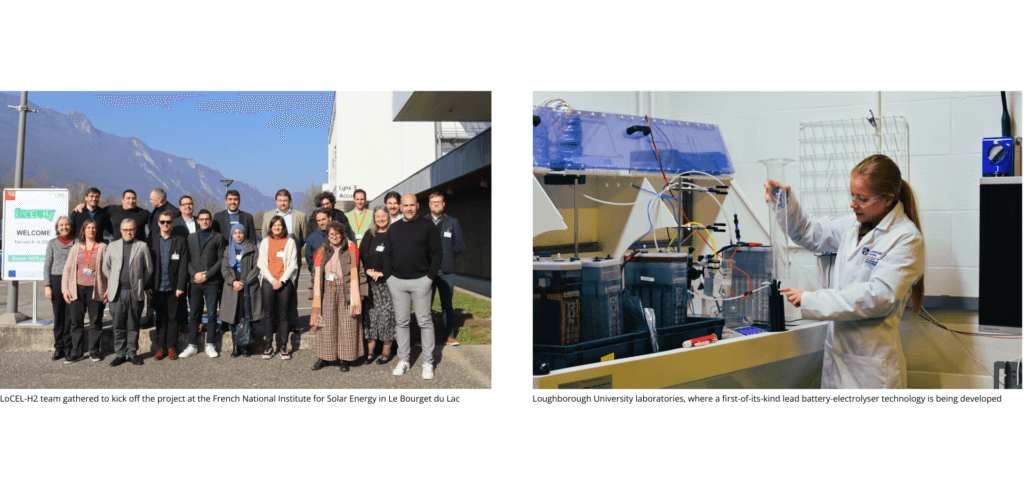
Beyond energy access, how does the project aim to influence societal change, for example?
At the heart of LoCEL-H2 is a deep commitment to societal change, particularly through empowering women in some of the world's most vulnerable areas.
We aim to see these women replacing old, smoky stoves with clean, green hydrogen, stepping into new roles, and changing the game in their communities. Our goal is to give them the time and resources they need to engage in social activities, achieve financial independence and be in charge of their own lives.
Moreover, with cleaner cooking, we are looking towards a greener future for them and the entire planet. It's a big vision, but with every step, we're closer to making it a reality.
Energy equity for sustainable future
Looking ahead, how do you plan to expand the reach of LoCEL-H2 to empower more communities worldwide?
Our aim for the future is to expand the impact of LoCEL-H2 beyond the current scope. We are working on integrating renewable energy into the very fabric of communities in need. This is particularly important when the world faces high energy demands and climate concerns, and sustainable solutions are needed more than ever.
Aligned with the EU's strategic priorities to mitigate climate change, LoCEL-H2 is committed to supporting the transition towards green energy across the globe, with a special focus on Africa, where the need is most acute. This can be achieved with collaborations with initiatives like Energising Africa and the Clean Cooking Manifesto. Increasing access to clean cooking is a topic that has been high on the global climate agenda, for example in the last United Nations Climate Change Conference COP28, and LoCEL-H2's technology is particularly well suited to be part of the solution.
Our approach is about connecting, sharing, and collective learning, which we believe to be some of the most valuable aspects of the project. We are sparking a movement through interactive webinars, training sessions, and collaboration with sister projects under Horizon Europe.
So, when discussing what's next for LoCEL-H2, it's all about showing that energy equity and a sustainable future are possible. LoCEL-H2 is dedicated to providing access to clean, green energy to communities worldwide. Its mission is to empower, inspire, and support the adoption of sustainable living practices worldwide.
DURHAM, N.C. – Jan 31, 2024 – As part of our continued efforts to support advanced lead battery uptake for energy storage applications, the Consortium for Battery Innovation (CBI) has joined as Teaming Partner of the U.S. National Consortium for the Advancement of Long Duration Energy Storage (LDES) Technologies.
Launched in January 2024, this three-year initiative funded by the U.S. Department of Energy (DOE) proposes an independent forum to bring together stakeholders across the LDES ecosystem. The main goal is to promote collaborations to develop and implement strategies necessary to achieve the commercialization of LDES technology within the next ten years.
The power sector is responsible for one third of emissions in the U.S. according to estimates by the U.S. DOE. The transition to carbon-free renewable sources must address the intermittent nature of wind and sun, and LDES is a key option to provide the needed flexibility and reliability to the grid. Batteries are among the most viable storage technologies for shifting excess power produced at one point in a day to another point within the same day (inter-day LDES), or to multiple days in the future (multi-day / week LDES).

The LDES National Consortium is led by Sandia National Laboratories with the support of five other National Laboratories - Argonne, Idaho, National Renewable Energy, Oak Ridge, and Pacific Northwest. The partnership already counts with over 130 Teaming Partners who are working together in Tiger Teams to identify and evaluate challenges in specific focus areas impacting LDES. One key aspect of the Consortium is its Diversity, Equity, Inclusion, and Accessibility Strategy, leveraging community engagement to ensure that LDES technology rollout brings concrete benefits to underserved communities.
CBI’s Research & Innovation Manager, Dr Alyssa McQuilling, and CBI’s Technical Director, Dr Matthew Raiford, are actively involved in eight of the sixteen Tiger Teams, namely: Technology Development, Evaluation and Testing; Demonstrations and Deployments; Investor Confidence and Finance; Use Case Development; Workforce Development; Reliability and Resilience; Economics and Valuation; Supply Chain and Manufacturing Efficiencies.
"The extensive infrastructure and domestic circularity offer an incredible opportunity for the industry to learn how we can adapt lead battery technology to the needs of LDES."
Dr Matthew Raiford, Technical Director at the Consortium for Battery Innovation
Our experts point out that advanced lead batteries are particularly well suited to inter-day LDES applications. They also see the potential around hybrid long duration systems, combining advanced lead batteries with another technology such as flow batteries to cover both short and long duration response. Dr Alyssa McQuilling said: “There is a lot of opportunity for lead batteries as a part of the solution for long duration storage, and the growth of the industry will require all kinds of technologies to meet the needs of utilities and other consumers.”
“I’m excited by the scale of the project, ranging from technology and use cases to markets and economics all the way to supply chain and workforce development. We are covering every challenge facing long-duration storage and the efforts of this consortium will benefit the energy storage industry beyond just its long duration applications.”
Dr Matthew Raiford said: “The US lead battery industry is uniquely poised to collaborate in this effort. The extensive infrastructure and domestic circularity offer an incredible opportunity for the industry to learn how we can adapt lead battery technology to the needs of LDES. The ongoing efforts from the US DOE LDES consortium will be a hotbed to learn and bring this learning into our industry.”
###
Notes to editors
About the Consortium for Battery Innovation
The Consortium for Battery Innovation is the world’s only global pre-competitive research organization funding research into lead batteries for energy storage, motive and automotive applications. For more than 25 years, with its global membership of battery manufacturers, industry suppliers, research institutes and universities, CBI has delivered cutting-edge research pushing the boundaries of innovation in lead battery technology, setting the standard for advanced lead batteries and the next generation of energy storage. For more information, visit our website: www.batteryinnovation.org
Dr Alyssa McQuilling, Research & Innovation Manager, and Dr Matthew Raiford, Technical Director, are available for interview. For more information, please contact CBI’s media contact: Nicola Filizola, nicola.filizola@batteryinnovation.org
Batteries are a fundamental driver of the green energy revolution. It is estimated that our society’s energy needs represent over 70% of all carbon emissions, with the largest shares coming from electricity and heat sources and transportation systems. The push to achieve net-zero is evident from numerous governmental initiatives such as the EU's commitment to cut carbon emissions by more than half by 2030, and global pacts such as the recent COP28 deliberations. To reach these goals means to effectively decarbonise the energy sector, and batteries will support the rollout of renewable energy infrastructure by providing energy storage capacity and reduce transport-related emissions by powering electric vehicles.
Batteries in energy markets are currently dominated by lithium-ion technology, but their employment in electric vehicles is given priority due to this technology’s unrivalled properties for this end use. This opens space for different technologies in other applications. Energy storage is a notable example, with battery energy storage capacity expected to grow twentyfold by 2030. All viable battery technologies will be needed to fulfil this soaring demand, and research & innovation to improve consolidated technologies is identified as an important way forward.
Lead batteries are currently the only other technology with well-established manufacturing and recycling infrastructure across the globe. But even if today's advanced lead batteries have come a long way from classic lead-acid car batteries in terms of overall performance, there are still various pathways for further improvements being discovered and explored.
The Consortium for Battery Innovation (CBI) is the only global lead battery pre-competitive research organisation. Our goals are to help deliver the advanced lead batteries needed for the energy transition and to demonstrate their power to bring real change. We do so by assessing market needs to define concrete research goals, by providing financial support to breakthrough projects through our Technical Program, and by establishing partnerships to develop pioneering advanced lead battery-based solutions.
In this overview, we discuss how some of our projects are paving the way to unlock the full potential of advanced lead batteries for the green energy transition.
The indispensable low-voltage ally
Electric vehicles are key for a decarbonised transport. As the nonstop evolution in automotive technology requires more and more from the main lithium-ion battery, smaller auxiliary batteries, also called low-voltage EV batteries, have been increasingly employed for safety back-up and supply power to specific electronic features. This means advanced lead batteries can work alongside lithium-ion batteries to ensure our future decarbonised road transport fleet is also safe.
CBI’s Technical Program has been supporting projects focused on automotive lead battery optimisation for start-stop, microhybrid and auxiliary use. Some encouraging results include improvements in the methodology of laboratory cell testing to investigate key parameters for automotive applications, and valuable insights on the role of additive formulations to enhance automotive battery performance. Ongoing studies, such as the investigation on microscopic changes in positive and negative electrodes during different charge conditions, along with future projects, will continue to provide guidance for better active material formulation and performance metrics.

Taking energy storage capability to the next level
The shift to renewable energy is just getting started, and more extensive rollout will be closely followed by a sharp increase in the need for energy storage systems to compensate for the intermittent nature of these energy sources. Global performance targets are aggressive and require different battery technologies with long lifetimes, high total energy throughput and low acquisition cost to meet technoeconomic needs. Our industry is focused on delivering longer lasting and more energy dense batteries to help meet the demand for utility, commercial, residential, and industrial energy storage applications.
Different projects supported by CBI’s Technical Program have been investigating advanced lead battery enhancements specifically for energy storage applications. Key findings so far include insights into barium sulphate additive configurations that can bring benefits to overall cycle life, and in-situ analyses during battery operation to understand charge and discharge processes and their products. More exciting results will come from projects and initiatives starting in 2024, including CBI’s involvement in the U.S. National Consortium for the Advancement of Long Duration Energy Storage Technologies. This will keep adding to our growing knowledge base and contributing to advanced lead battery performance improvement for energy storage.

Powering a just transition
The lack of access to both electricity and clean cooking, known as energy poverty, remains a pressing global issue. It is estimated that 775 million people lack access to electricity and 2.2 billion people lack access to clean cooking fuels, mostly in Sub-Saharan Africa and developing Asia. Providing universal clean energy access leaving no one behind is essential for a successful green energy transition. But the rollout of renewable energy in areas with no or incipient grid infrastructure is challenging, and lowering investment costs is a must. Through ongoing partnerships, we are demonstrating that the combination of microgrids and advanced lead battery storage is an excellent solution to provide clean and affordable energy for remote communities.
In an ongoing initiative funded by Horizon Europe, we are helping to develop a deployable clean energy solution with provision of electricity through prosumer-based solar microgrid coupled with an energy storage system made of advanced lead batteries. One core innovation in this battery energy storage system is the addition of an electrolyser to produce green hydrogen, which can be used as clean cooking fuel. By the end of the project in 2026, the team will deploy two full-scale pilots of this pioneering energy solution, one in Côte d'Ivoire and one in Zambia.
CBI is also contributing to another smart solution, this one already in testing phase: a solar energy microgrid with a combined micro electric tractor. Advanced lead batteries power both the microgrid energy storage system and the tractor. The project, funded by Innovate UK, aims to bring a 2-in-1 solution for rural communities by providing clean energy and optimising land preparation. Recent field demonstrations have shown the potential of the micro electric tractor to significantly increase crop yields, which will help to increase smallholder incomes. The solution has been selected as one of the finalists of a prestigious international green energy prize.
Novel solutions like these not only alleviate energy poverty issues but also provide a pathway toward citizen empowerment. They can substantially contribute to universal access to modern energy and to achieve other Sustainable Development Goals regarding poverty reduction, health and education.

This is why we believe the future is bright and green and we will continue to drive advanced lead battery innovation for sustainable development and a climate-resilient future.
Our colleagues Matt Raiford, CBI's Senior Technical Manager, and Alyssa McQuilling, CBI's Research and Innovation Manager, were featured in the latest Beyond Lithium podcast episode hosted by Nate Kirchhofer from BioZen Batteries. The discussion revolved around the work of CBI, research and innovations driving the industry, exciting new projects, unique features of advanced lead batteries and the future of energy storage.
CBI's projects and mission
Matt kicks off the conversation by outlining CBI's mission as a pre-competitive global research organisation with over 130 members worldwide. According to Matt, the priority of pre-competitive research lies in CBI's focus on applications and innovations benefiting the entire lead battery industry. "It's like taking a step back and looking at first principles," Nate summarises, as both guests noted.
The conversation reveals CBI's projects, showcasing an advanced lead battery technology for different applications. Matt and Alyssa shed light on CBI's involvement in global government funding opportunities, with recent projects spanning Europe and the UK. Alyssa introduces the current LoCEL-H2 project, featuring the unique battery-electrolyser. The technology stores energy to produce electricity on demand and utilises initially unwanted side reactions to produce hydrogen for cooking purposes. Another noteworthy project, Aftrak, showcases a solar advanced lead battery-powered tractor for deep-farming piloted in Africa. "These projects highlight something really important about batteries in general, that they can enable a whole new way of living," noted Matt.

A closer look at lead batteries
The podcast takes a turn as the team delves into the chemistry of lead batteries. "Lead batteries have been around for a hundred years, and they've been doing a lot of work," Nate acknowledges, addressing the never-ending question of getting people excited about lead. Dispelling misconceptions around lead batteries, Matt and Alyssa passionately discuss their unique benefits, including sustainability, an increasingly relevant factor in today's society. "Lead is the most recyclable product in the world," Matt emphasises, "This results in a recycling rate of over 99% in the US and Europe."
Energy storage takes centre stage in the conversation, as it has been emerging prominently in political dialogues worldwide. According to Matt, the performance rate of lead batteries is the main driver for energy storage. First invented in a French man's backyard, lead batteries evolved drastically into well-adapted products. As a scientist, Matt wondered how this technology didn't advance when he came across it years ago. The explanation is simple: there was no market driver. Nowadays, there is one. "That's what we're doing at the CBI. A lot of our research is inspired by the needs of the market," Matt explains.
The future of energy storage
"We need a lot of energy storage integrated into the grid as we decarbonise and electrify more," Alyssa states, touching on the need for diverse technologies to meet the escalating need for clean energy. This offers countless opportunities across sectors. The demand for energy storage and battery innovations go hand in hand. Improvements in cycle life and battery materials are a few examples of research in national labs, where new technologies and techniques are involved to better understand batteries at a fundamental level.
The podcast concludes with a forward-looking perspective on the future of energy storage. The energy storage sector's scale and pace of development promise a huge demand for batteries. "We see a steady growth for lead. For energy storage, the sky's a limit. We're talking about terawatt-hours batteries needed by 2030," Matt says, highlighting the increasing need for diverse technologies to coexist harmoniously. "We just have to create a cheap battery that lasts a long time," he concludes with a smile.

A special thanks to our colleagues, Matt Raiford and Alyssa McQuilling, for this insightful conversation, showcasing the work at CBI and providing valuable insights into the role of lead batteries in shaping a sustainable and energy-efficient future. Listen to the full podcast on the Beyond Lithium website.
The COP28 conference marked an important moment in the global conversation about energy storage and batteries. While signalling the need to move away from fossil fuels, it emphasised the potential of energy storage to shape a sustainable energy future significantly.
The 28th Conference of the Parties (COP28) to the United Nations Framework Convention on Climate Change was held in Dubai from 30th November to 12th December. The conference brought together global leaders, experts, and stakeholders to address the pressing issue of climate change. The theme of COP28 was "Building a Resilient Future," focusing on accelerating global action to limit global warming to 1.5 degrees Celsius above pre-industrial levels.
Despite the scepticism that preceded the conference, particularly surrounding the host nation, Dubai, a major oil producer, COP28 emerged as a revolutionary climate change summit. For the first time in 28 years, fossil fuels were formally recognised as the primary driver of climate change. This acknowledgement, a significant shift from the previous COPs, marked a turning point in the international community’s approach to climate change. It challenged the long-held narrative that fossil fuels were necessary for the energy mix and laid the foundation for a faster transition to a low-carbon economy. This formal recognition of fossil fuels’ role in climate change was not just a symbolic gesture but led to a series of bold decisions and commitments to accelerate the global transition to clean energy sources. Over 100 countries pledged to phase-out coal power by 2030, which is a huge milestone in decarbonising the energy sector.

Energy storage for green transition
COP28 provided an opportunity for stakeholders to discuss the complexities of energy storage technologies and their potential to contribute to a more sustainable energy future. The discussions focused on integrating renewable energy sources, enhancing the stability of power grids, and addressing the issue of energy poverty. COP28 witnessed several notable developments related to energy storage, including the launch of the Supercharging Battery Storage Initiative and the Multilateral Consortium for Battery Storage.
Member governments of the Clean Energy Ministerial (CEM), including the European Commission, Australia, Canada, and the United States, announced the launch of the Supercharging Battery Storage Initiative in Dubai. This initiative aims to increase the capacity of battery storage in the power grid while ensuring a transparent, resilient, and sustainable energy system. It is focused on reducing technology costs, as batteries play a crucial role in creating a flexible and reliable energy system. Through this initiative, member governments of the CEM are committed to a cleaner and more accessible energy future. “Battery storage will be the backbone of the green transition with an essential role in decarbonising transport and energy. It will enable a truly decentralised and integrated energy system based on efficient use and renewable generation,” said Maroš Šefčovič, Vice President of the European Commission.
Bridging the energy gap
The Global Leadership Council announced the formation of the Battery Energy Storage Systems (BESS) Consortium, with participation from 11 African countries. The consortium has pledged to deploy a minimum of 5GW of battery storage systems in Africa by 2030. The initiative seeks to tackle energy poverty and improve access to reliable electricity in low- and middle-income nations on the continent. Dr. Rajiv J. Shah, the President of The Rockefeller Foundation and Co-chair of the GLC, highlighted the need for transformative initiatives. He stated that "Without sufficient storage capacity, countries will be unable to add renewable energy to their grids at the scale needed to reduce emissions and create economic opportunity. The BESS Consortium is an example of the sort of big, bold action required to break down the barriers that are preventing people and communities from joining the ongoing climate transformations."

As part of the COP28 agreements on energy storage, the United States and partner countries of the Net Zero World initiative have announced significant progress in building clean and secure energy systems in emerging economies. This includes helping Ukraine deploy distributed renewable energy and storage systems for critical infrastructure. Participants of COP28 have also called for increased investment in research and development for energy storage technologies. The aim is to accelerate innovation, improve performance, and reduce costs, making energy storage more accessible and cost-effective.
Advancing a cleaner future
The decisions and commitments made at COP28 are a step forward in the global effort to combat climate change. By acknowledging the role of fossil fuels in climate change and committing to a rapid transition towards a low-carbon economy, COP28 has set a new course for the international community.
Moreover, the conference marked an important moment in the global conversation about energy storage. COP28 emphasised the potential of energy storage to significantly shape a sustainable energy future. Initiatives such as the Supercharging Battery Storage Initiative, BESS Consortium, and Net Zero World all point in one direction, addressing energy poverty, promoting sustainability, and achieving clean energy goals. To achieve this, we need all battery chemistries.
The conference's outcomes indicate a renewed commitment to accelerating the development and deployment of these technologies. As energy storage becomes more widespread and cost-effective, it will play a critical role in addressing climate change, ensuring energy access, and creating a more resilient and sustainable energy system.
The Consortium for Battery Innovation is actively involved in the rollout of advanced lead battery energy storage systems to contribute to global climate goals. In two ongoing energy storage projects, LoCEL-H2 and Aftrak, we are helping develop BESS combined with solar microgrids to provide a sustainable, reliable, low-cost energy system for remote communities. These projects also demonstrate how energy storage solutions are key to achieving a just transition, helping to increase food access, health outcomes and gender equality. With more energy storage projects underway, CBI will continue to support sustainable development for a climate-resilient future.
Battcon 2024 Miami, Florida, May 14-17
The Consortium for Battery Innovation has been appointed to manage the prestigious Battcon energy storage conference in the United States.
Battcon 2024 takes place in Miami, Florida, between May 14-17 at the Hyatt Regency Miami, with pre-conference workshops taking place on Tuesday May 14 followed by the full conference and trade show.
Battcon is an annual stationary storage battery conference showcasing developments in all battery chemistries which has been held in Florida for more than 25 years. The event, which attracts more than 400 delegates plus exhibitors, acts as a professional development and networking opportunity for the design, selection, and application of stationary, utility and energy storage battery systems.
CBI has issued a call for papers inviting speakers to submit abstracts on potential topics demonstrating new technical enhancements for all battery chemistries for the 2024 event. The conference is an opportunity for manufacturers and users to review the latest trends in stationary storage, including data-centers, telecoms, utility and energy storage applications.
View details and submit your abstract at www.battcon.com. Abstracts can be submitted directly by email to events@battcon.com

The Consortium for Battery Innovation is a global battery research group developing and promoting batteries and battery energy storage solutions.
CBI Director Dr Alistair Davidson described Battcon as a highly-respected industry event adding that CBI would continue to ensure the technical program and exhibition maintained its reputation for excellence.
He said: “We are committed to maintaining this important industry event and ensuring that Battcon continues to develop and grow alongside the energy storage industry. The conference is a significant professional development and educational opportunity supporting all battery technologies and chemistries. We have extensive experience managing technical events and given the exciting opportunities for stationary storage across many applications this conference will remain at the forefront of the green energy transition.”
Curtis Ashton, chair of the eleven-member Battcon technical committee, said: “Battcon is a popular, user-focused conference and as a technical committee we were keen that an organisation committed to battery energy storage should take on its management and future development. The committee felt CBI would be the best option. Its expertise and enthusiasm means that we can look to the event’s continued growth and focus on the rapidly evolving stationary battery industry.”
NEWS RELEASE - 21 November 2023
The ELBC battery innovation conference has issued a call for papers ahead of the event which takes place in Milan, between September 16-19.
Jointly organised by the International Lead Association and Consortium for Battery Innovation, the event’s technical committee is seeking abstracts on all aspects of lead battery technology with a specific focus on:
Dr Alistair Davidson, Director of the Consortium for Battery Innovation, said: “This is always a much-anticipated event for the lead and lead battery industries and we’re looking for high quality submissions that showcase recent innovations and all the latest lead battery research.”
Abstracts can be submitted online by visiting www.elbcexpo.org
More than 1000 attendees are expected at the event in Milan which includes an expo with up to 140 exhibitors from across the lead battery value chain.

About the Consortium for Battery Innovation (CBI)
For more than 25 years, CBI has delivered cutting-edge research taking lead batteries to a new level for energy storage and automotive applications. With an expert panel made up of the world’s leading battery manufacturers and research specialists, CBI is setting the standard for advanced lead batteries and the next generation of energy storage.
The Consortium for Battery Innovation's impactful presence at European Commission’s SET Plans Conference
In the ever-evolving landscape of energy storage, the Consortium for Battery Innovation (CBI) stands at the forefront, driving advancements in battery technology. At the recent SET Plans Conference in Viladecans, the CBI had a strong presence with its Senior External Affairs Manager, Nicola Filizola, showcasing the consortium's commitment to fostering collaboration and innovation within the energy transition landscape.
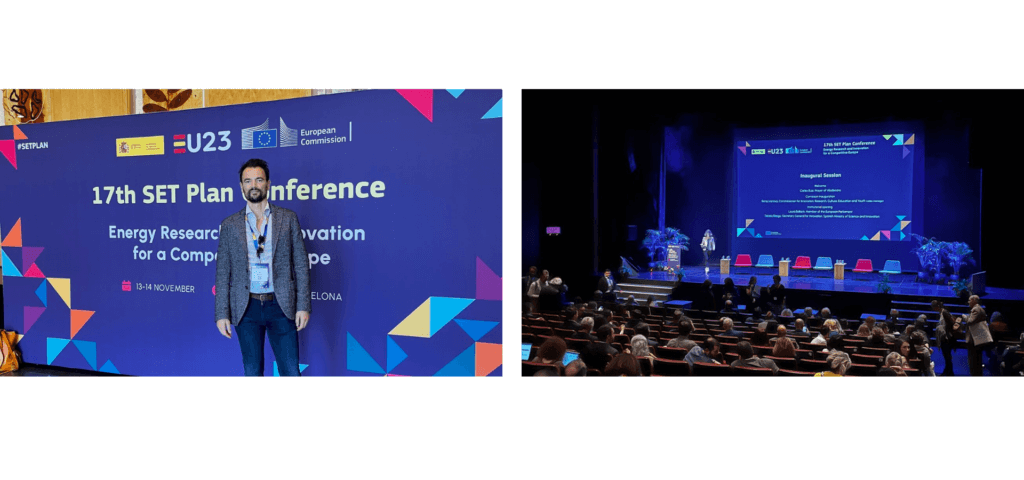
The revamped SET Plans to address energy policy
The European Strategic Energy Technology (SET) Plan was established in 2007 and since the creation of the energy union in 2015, it became one of the main instruments of the energy union’s 5th pillar on research, innovation, and competitiveness.
During the conference, the European Commission confirmed its commitment to reinforcing the SET Plan, and its acknowledgement of the key role that the initiative will play in delivering the European Green Deal, REPowerEU and the Green Deal Industrial Plan, with a particular emphasis on the Net Zero Industry Act. This will help to accelerate the clean energy transition, increase the EU’s competitiveness, and ultimately deliver the EU’s ambitious climate and energy objectives.
Boosting European competitiveness and technology sovereignty
The EU is a frontrunner in the deployment of sustainable energy solutions and in clean energy research and innovation. However, this leadership is not matched by an equally strong position in the manufacturing of net-zero technologies.
To strengthen Europe’s technological and industrial sovereignty, the European Commission has proposed the Green Deal Industrial Plan, which includes the Net-Zero Industry Act for increasing the EU manufacturing capacity of net-zero technologies, and the Critical Raw Materials Act for securing the supply of critical raw materials. The revised SET Plan will help convert innovations into marketable solutions that can be produced and scaled up in the EU.

Advancing battery technologies
The SET Plans Conference served as a global platform for discussing Sustainable Energy Technology Plans, bringing together experts, policymakers, and industry leaders to deliberate on the future of energy technologies. The CBI consortium's presence was crucial in highlighting the pivotal role that advanced lead battery technologies play in achieving sustainable energy goals.
As the battery industry continues to play a pivotal role in the global transition to clean energy, the CBI's active participation in conferences of this nature reinforces its position as a driving force in shaping the future of energy storage.
For more information on how to develop and reinforce the Brussels footprint for the advanced lead battery ecosystem, feel free to contact our Senior External Affairs Manager at nicolafilizola@batteryinnovation.org
NEWS RELEASE - 17 November 2023
A new call for research proposals to support advanced lead battery innovation for energy storage systems (ESS) has been launched by the Consortium for Battery Innovation (CBI), the world’s only pre-competitive lead battery research consortium.
We are seeing an unprecedented effort to implement climate targets across the globe, led by the ambitious commitments by the European Union to become climate-neutral by 2050 and by the US to reduce emissions by 50% by 2030. According to Avicenne Energy (CBI’s Market Report 2023), the ESS market is forecasted to grow from 237 GWh in 2022 to 616 GWh in 2030. Batteries stand out as one of the big facilitators of this global shift to clean energy considering any scale of implementation, from industries to residences.
Recent analyses agree that a significant increase in battery demand will occur by 2030. Noteworthy examples are the forecast by the International Renewable Energy Agency (IRENA) that cumulative global renewable energy battery storage capacity will increase from 17 GW in 2020 to 359 GW in 2030 and estimates by the International Energy Agency (IEA) showing battery storage capacity for solar power integration only will increase at least five times by 2030. Demand will be so large it cannot be met by one battery technology alone. Such prognoses are a significant opportunity for growth of the lead battery market as a potential technology that can meet all the technical requirements on a mass market scale.
Building on the research priorities and research and innovation pathways defined on CBI’s Technical Roadmap, this call for proposals aims to stimulate projects further demonstrating improvements in lead battery performance for ESS applications. Dr Matthew Raiford, Senior Manager of CBI’s technical program, said: “The growth of the battery energy storage market is a great opportunity for advanced lead batteries, and the industry is committed to showing progress toward batteries that last longer and have higher energy density. CBI’s research program and this new request for proposals will directly contribute to that goal.”
CBI’s open call specifies two work proposal possibilities consisting of a) technoeconomic analyses of lead battery ESS or b) material science studies of failure of lead batteries in ESS. Submission of proposals is open until 22nd January 2024. More information on the desired work and guidelines for proposals is available here.

About the Consortium for Battery Innovation (CBI)
For more than 25 years, CBI has delivered cutting-edge research taking lead batteries to a new level for energy storage and automotive applications. With an expert panel made up of the world’s leading battery manufacturers and research specialists, CBI is setting the standard for advanced lead batteries and the next generation of energy storage. For more information, visit our website: http://www.batteryinnovation.org
Dr. Matthew Raiford is available for interview. For more information, please contact CBI’s media contact: Nicola Filizola, +32 489 17 76 60; nicola.filizola@batteryinnovation.org
Press release
Brussels, 9 November 2023
A system using advanced lead batteries to power a micro electric tractor tailored to the African market was selected as one of the finalists of the Milken-Motsepe Prize in Green Energy.
This innovative tractor design is being developed in Aftrak, a groundbreaking project funded by Innovate UK. The initiative brings together expertise from the Consortium for Battery Innovation (CBI), Loughborough University and UK- & Malawi-based charity Tiyeni, and the support of lead battery manufacturer VARTA.
Microgrid solutions for off-grid rural communities have high costs of implementation and maintenance that often cannot be covered by the communities, dissuading infrastructure investments. Aftrak is addressing this challenge by combining a solar energy microgrid with a micro electric tractor to mechanise land preparation. The tractor accelerates the implementation of Deep Bed Farming, an agricultural methodology developed by Tiyeni especially designed for Malawian soils. This system can provide a significant agricultural revenue boost to sustain microgrid-related costs and encourage further energy access investments.
Lead batteries inbuilt in the micro electric tractor play a central role in this green energy system, storing solar energy and providing it during land preparation activities. Dr Carl Telford, member of the Aftrak team and CBI Senior Research and Innovation Manager, said: “This is a very promising application of lead batteries that can bring real positive impact to rural communities. Having the recognition by the Milken Institute and the Motsepe Foundation is an important endorsement of the viability of lead batteries in green energy solutions.”
The Milken-Motsepe Prize in Green Energy is a global competition to reward innovators working to increase access to green, renewable energy in Africa. This year, over 160 teams from 36 countries presented their visionary ideas to the jury.
Selected as one of the five finalists, the Aftrak team will receive $70,000 in funding to further develop and test the system in a live field demonstration in South Africa in February 2024. Aftrak also remains in the competition for the final prize of $1 million, whose winner will be announced in May 2024.

About the Consortium for Battery Innovation (CBI)
For more than 25 years, CBI has delivered cutting-edge research taking lead batteries to a new level for energy storage and automotive applications. With an expert panel made up of the world’s leading battery manufacturers and research specialists, CBI is setting the standard for advanced lead batteries and the next generation of energy storage. For more information, visit our website: http://www.batteryinnovation.org
Dr Carl Telford is available for interview. For more information, please contact CBI’s media contact: Nicola Filizola, +32 489 17 76 60; nicola.filizola@batteryinnovation.org
Planning is Underway for LoCEL-H2, a Four-Year, €10million Sustainable Energy Storage Project, Co-funded by the European Union
[LE BOURGET-DU-LAC, February, 2023] – A recently won European Union project by the Consortium for Battery Innovation (CBI) will pair advanced lead batteries with green hydrogen to deliver a new source of clean, reliable, and sustainable energy storage for off-grid communities in Africa.Awarded through Horizon Europe, this collaborative, four-year project called LoCEL-H2, (or Low-cost, Circular, plug & play, Off-grid Energy for remote Locations including Hydrogen), combines the expertise of lead battery manufacturers, academia, national laboratories, component manufacturers, and companies who are focused on integration, microgrids and renewables.
LoCEL-H2 will generate renewable energy, storage, and fuel for deployment in isolated and remote regions of Africa, to support communities that cannot connect to an electricity grid.
“The excitement around this innovative project is reflected by everyone involved,” said Dr. Carl Telford, the senior research and innovation manager at CBI. “Energy poverty is a problem that affects millions of people worldwide because they lack consistent access to electricity.”
The majority of the world’s population living in energy poverty are in Sub-Saharan Africa and are dependent on traditional stoves and fuels for their cooking. As a result, most of the domestic chores are handled by the women in these households, who then develop an increased health risk from a constant exposure to biomass, kerosene and/or coal fuels used for cooking.

The LoCEL-H2 project will provide a sustainable energy source as well as access to clean fuels. Another benefit will result in the education levels within these communities being positively impacted since they will now have access to online information through a reliable energy connection.
“This project is important to help address the United Nations Sustainable Development Goal 7 (Affordable and Clean Energy), while having an impact on other areas such as health,” noted Dani Strictland, professor of electrical power engineering at Loughborough University and a member of the LoCEL-H2 partnership.
This project involves nine partner companies across western Europe who will develop new technology for a novel distributed microgrid, as well as a Battolyser. The Battolyser is a new solution for producing clean hydrogen technology to power cooking surfaces and would replace biomass fueled stoves.
Whether as a response to climate impacts or future energy storage needs, advanced lead batteries are often an overlooked and innovative technology that bring safe, reliable, low-cost solutions to pair with a renewable source.
By combining lead batteries with wind and solar power, this forward-looking energy storage project will deliver ongoing, affordable electricity to off-grid communities and become a deployable solution for other energy-deprived areas around the globe.
The two pilot areas for the project will be focused in Zambia and Ivory Coast. Angel Kirchev, a senior expert, Ph.D., HDR, at CEA Tech and LoCEL-H2’s project coordinator said, “CEA looks forward to coordinating this exciting and challenging 4-year project which will bring sustainable energy and green hydrogen to challenged communities.”
Watch our LoCEL-H2 Kick-Off Video here.
![]() Project Co-Funded by the European Union
Project Co-Funded by the European Union
The members of the partnership are CEA, Hoppecke, Hollingsworth & Vose, UNINA, Loughborough University, Sunkofa, University of Gabes, SAS Réseaux Hydrogène Décarboné RHYDE, and LUMS.
Contact: Lara Wilson
CBI Sr. Communications Manager
Lara.wilson@batteryinnovation.org
About Consortium for Battery Innovation
The Consortium for Battery Innovation (CBI) is the world’s only global pre-competitive research organization funding research into lead batteries for energy storage, motive, and automotive applications. For more than 25 years, with its global membership of battery manufacturers, industry suppliers, research institutes, and universities, CBI has delivered cutting-edge research pushing the boundaries of innovation in lead battery technology, setting the standard for advanced lead batteries and the next generation of energy storage.
For more information, visit our website: batteryinnovation.org
About Loughborough University
Loughborough University is the home of world leading engineering, with an international reputation for being at the forefront of technological innovation and for maintaining extensive links with industry. The Wolfson School of Mechanical, Electrical and Manufacturing Engineering is one of the biggest engineering schools of its kind in the UK. The school aims to provide international leadership in research and innovation with a focus on climate change and net zero and has an unrivalled educational experience. Loughborough University is consistently in the top 10 in many university ranking tables for student experience.
Learn more at lboro.ac.uk/departments/meme/.
###
NEWS RELEASE
The U.S. Army has chosen advanced lead battery energy storage systems to enhance its operational effectiveness in disaster zones and in combat.
A project led by Paragon Solutions, Inc., and the Consortium for Battery Innovation (CBI) is providing a new set of systems that can provide power for critical military operations anywhere in the world.
Paragon, a woman-owned engineering firm, and a member of the Consortium for Energy, Environment, and Demilitarization (CEED), partnered with CBI, a global lead battery research hub, to develop the winning proposal in response to a request issued to CEED members by the Consortium Management Group (CMG). The effort is sponsored by the U.S. Government under an Other Transaction Agreement between CMG and the U.S. Army Corps of Engineers.*
Paragon and CBI will develop transportable, robust, lead battery energy storage systems that can be integrated into tactical microgrids and demonstrated at the Contingency Basing Integration Training Evaluation Center (CBITEC) at Fort Leonard Wood, Missouri. The CBITEC site is managed by the U.S Army Engineer Research and Development Center, Construction Engineering Research Laboratory (ERDC-CERL).
The eighteen-month $3.5 million program also seeks to demonstrate how U.S. Army units can use lead batteries sourced from the Department of Defense supply system and from locally available sources such as vehicles, while increasing the lifecycle for certain battery types to meet battlefield energy demands.
Retired U.S. Army Captain and government technical lead for this project, Tom Decker, said: “This is an important project to the Army because in any type of contingency environment, while in combat situations or following a natural disaster, it all falls back on the Army Corps of Engineers to provide power to continue operations. And this is where lead batteries come in.”
“By being able to use lead batteries that are available on the ground and make an energy resource out of them, we have the ability to continue whatever mission we’re on, be it disaster relief or engaging in combat.”
“This just adds to our capabilities. The durability of lead batteries has been proven over many decades so we know what we’re getting when we use the technology. But then we get the added value of the advanced lead battery systems which the industry supplies, and this is the technology that makes the systems viable.”
“Lead batteries give us the ability to deploy energy storage systems anywhere in the world, enhancing our resiliency. And one of the current US administration’s priorities is reducing carbon footprint, so by decreasing our use of fuel and adopting more innovative energy storage systems, we’re reducing our carbon footprint too.”
Implementation of the systems will be done to NATO specifications, and if successful, would allow for deployment in many different countries. This solution aims to overcome issues with host nation power grids by designing an energy storage system that accepts host nation power, stores it, and then provides it in a form that is compatible with U.S. Army equipment.
The resiliency, safety and reliability of power supplies are priorities for military operations. Lead batteries have been chosen for the project as the technology of choice because of their inherent safety and robustness in extreme weather as well as their availability in the field. Using lead batteries would provide Army Commanders with local sources of batteries in vehicles and telecommunications towers around the world.
The Paragon/CBI team will develop energy storage systems providing between 125kWh to 250kWh of critical energy using three different lead battery technologies provided by US-based battery manufacturers, Advanced Battery Concepts (ABC), East Penn Manufacturing and EnerSys. These operational workhorses will be transportable, easy to operate by military personnel, and can be integrated into tactical microgrids to provide power for critical loads.
The project team will also develop a ‘plug-and-play’ 30 kWh energy storage system, which will give soldiers the ability to plug into an energy storage source made up of used lead batteries found in locally available sources, such as vehicles. Marcus Ferguson, ERDC-CERL project officer, and manager of the CBITEC site said: “After Hurricane Maria in Puerto Rico in 2017, approximately 130,000 damaged vehicles were lying unused with an untapped energy source: lead batteries. If this energy could be harvested, future disaster relief and other military operations, wherever they are in the world, could be provided with reliable, low-cost energy”.
The prototype lead battery energy storage systems will be constructed and tested in various simulated duty cycles to recreate typical field conditions for military operations. The aim is to develop systems that could be rolled out across the U.S. Army. Furthermore, when the lead battery ESS prototypes are connected to Army tactical quiet generators (TQGs) the systems will provide low heat signature and quiet energy assets - essential requirements for U.S. Army activities in the field.
Dr. Matt Raiford, CBI project manager, added: “Lead batteries have been chosen for this important project based on their resilience, consistent performance at all temperatures and their accessibility. This will set a benchmark for smaller microgrids providing essential power and security in a range of settings from remote rural areas to larger military installations.”
Raiford continued: “CBI is committed to developing advanced lead batteries for energy storage applications and the recognition that this mainstay technology has been chosen to support U.S. Army operations is testament to the inherent safety, reliability and sustainability of the technology.”
*Effort sponsored by the U.S. Government under Other Transaction number W9132T209D001 between the Consortium Management Group, Inc., and the Government. The U.S. Government is authorized to reproduce and distribute reprints for Governmental purposes notwithstanding any copyright notation thereon.
The views and conclusions contained herein are those of the authors and should not be interpreted as necessarily representing the official policies or endorsements, either expressed or implied, of the U.S. Government.
END
Notes to editors:
1: For more information please contact Hywel Jarman in the CBI media office on +44 7718 483887. Visit www.batteryinnovation.org.
NEWS RELEASE
A project pairing advanced lead batteries with green hydrogen could transform the supply of clean, reliable energy storage in Africa and Asia, after the Consortium for Battery Innovation formed a partnership awarded Horizon Europe funding worth almost €10 million.
The collaboration between organisations in the project - called LoCEL-H2 (Low-cost, Circular, plug & play, off-grid Energy for remote Locations including Hydrogen) – includes battery-makers, academia, national laboratories, component manufacturers and companies with experience of integration, microgrids and renewables.
The project will generate clean, reliable, sustainable energy for deployment in off-grid communities in regions such as Africa and Asia, using a lead-battery electrolyser – known as the battolyser – to support isolated communities who cannot connect to an electricity grid.
The battolyser is a novel, low-cost solution for producing clean hydrogen-powered cookers replacing firewood stoves. The International Energy Agency predicts that 2.5 billion people globally rely on firewood and stove-based cooking, predominantly performed by women in low-income countries.
By installing battery energy storage, paired with renewable systems harnessing wind and solar power, this innovative project will enable reliable and low-cost electricity to be supplied to hard-to-reach communities.
Dr Carl Telford, Research and Innovation Manager at CBI, said: “We are delighted to win Horizon Europe funding for such an innovative project. CBI is fortunate to have an incredible team of partners, enabling us to develop a truly new concept, featuring not only a specially designed lead battery, and a novel distributed microgrid, as well as the battolyser hydrogen technology. It’ll also be developed with social-science and business experts to ensure we can make a positive difference to those communities using the technology.”
The members of the partnership are CEA, Hoppecke, Hollingsworth & Vose, UNINA, Loughborough University, Sunkofa, University of Gabes, SAS Réseaux Hydrogène Décarboné RHYDE, and LUMS.
LoCEL-H2 advisory-board member Patrick Clerens - Managing Director of the CLERENS team that worked with CBI to develop the bid - said: “Combining long and short-term storage as well as integrating different energy vectors is the beauty of this project. We at CLERENS are very happy to have written this winning proposal and are sure that the results will further the integration of renewable energy for energy-deprived communities and energy islands, and therefore a reduction of fossil fuel use.”
Committed to research and innovation, this new European Commission funded project recognizes the innovative potential of advanced lead batteries and related technologies to usher in the renewable energy ambitions of communities around the globe.
END
Notes to editors:
About Consortium for Battery Innovation:
NEWS RELEASE
Supporting advanced lead battery research and innovation, the Consortium for Battery Innovation (CBI) has welcomed its newest member - and largest Indian battery manufacturer in membership - Amara Raja.
Headquarted in Tirupati, Andhra Pradesh, India, Amara Raja Batteries Limited (ARBL) is a technology leader that has been instrumental in the development and production of advanced lead battery technologies since it’s establishment in 1985.
Working in both the automotive and industrial sectors, Amara Raja is a leading supplier for industries including OEM, UPS, telecoms and solar energy storage in India as well as countries in the Indian Ocean rim. Demand is on the rise for batteries in India, forecast to grow to 260 GWh annually by 2030.
Partnering with industry, research institutes and universities across the globe, CBI drives pre-competitive research to deliver the next generation of advanced lead batteries with enhanced performance to meet future market demand.
Ambitious targets are underway in India’s renewable energy storage sector, with goals of adding 300 GW of renewables by 2030. The need for high-performing, sustainable and innovative lead batteries is more critical than ever to support this clean energy transition which will represent a 20% year-over-year growth in solar and wind capacity.
CBI’s Director, Dr Alistair Davidson, said: “We are excited to have Amara Raja on board as our newest and largest Indian lead battery manufacturer. This regional market is extremely important for lead batteries, particularly in energy storage, and we’re looking forward to working with them to really drive innovation in the technology.”
ARBL Chief Technology Officer, Mr. Jagadish M, said, “We are excited to be part of this consortium. We look forward to leveraging this opportunity to dominate the energy sector with innovative products. By working together, we can improve our technical capabilities and explore many energy-related applications.”
ARBL Executive Director, Mr. Harshavardhana Gourineni, said: “We are honored to be a part of this consortium, which brings together, and shares innovations and cutting-edge technology. We continue to be delighted to engage with businesses that complement our strengths and help generate value in our growth areas. This relationship will provide us with space for new generation energy storage and global corporate expansions.”
CBI organizes high-impact technical workshops for its membership throughout the year in North America, Europe, China and, for the first time this year, India. These events bring together leading global battery experts to stimulate technical discussion about the latest research and developments in the technology. The meetings also identify key innovation pathways for future advanced batteries to delve into the significant untapped potential of lead battery technology.
###
Notes to editors
About the Consortium for Battery Innovation
The Consortium for Battery Innovation is the world’s only global pre-competitive research organization funding research into lead batteries for energy storage, motive and automotive applications. For more than 25 years, with its global membership of battery manufacturers, industry suppliers, research institutes and universities, CBI has delivered cutting-edge research pushing the boundaries of innovation in lead battery technology, setting the standard for advanced lead batteries and the next generation of energy storage. For more information, visit our website: www.batteryinnovation.org
About Amara Raja
Amara Raja Batteries Limited is an Energy and Mobility enterprise and one of the largest manufacturers of energy storage products for both industrial and automotive applications in the Indian battery industry.
In India, Amara Raja is the preferred supplier to major telecom service providers, Telecom equipment manufacturers, the UPS sector (OEM & Replacement), Indian Railways and to the Power, Oil & Gas, among other industry segments. Amara Raja’s industrial battery brands comprise PowerStack®, AmaronVolt® and Quanta®. The Company is a leading manufacturer of automotive batteries under the brands Amaron® and PowerzoneTM, which are distributed through a large Pan-India sales & service retail network.
The Company supplies automotive batteries under OE relationships to Ashok Leyland, Ford India, Honda, Hyundai, Mahindra & Mahindra, Maruti Suzuki, and Tata Motors. The Company’s Industrial and Automotive Batteries are exported to countries in the Indian Ocean Rim.
NEWS RELEASE
Delegate registration is now open for ELBC in Lyon, France, between 6-9 September, with a packed technical program and pre-conference events.
The much-anticipated ‘Batteries for the Future’ conference program - with expert technical sessions on automotive and energy storage systems as well as market insights – also includes, for the first time, a workshop on Lead Batteries in Electric Vehicles and a Battery Academy.
Up to 1000 attendees are expected to visit the event, which takes place at the congress centre in Lyon, and is co-organised by the International Lead Association and Consortium for Battery Innovation.
Keynote speakers providing their business insights include East Penn President and CEO Chris Pruitt and Stefan Stübing, President and CEO at Exide Group. Leading analysts will survey the market landscape including Christophe Pillot (Avicenne Energy), Neil Hawkes (CRU), Nick Starita (Hollingsworth & Vose) and Ray Kubis (Gridtential). In addition, there is a strong technical program of 50+ speakers on all aspects of lead battery innovation.
Dr Andy Bush, Managing Director of ILA, said: “ELBC is organised by the industry, for the industry and we are delighted to once again hold this event in person. As well as the respected technical program, we have new sessions including a workshop on lead batteries in EVs. And we’re introducing a battery academy for the first time which is aimed at anyone who would like to know more about the wide range of lead battery applications and technologies available.
“Alongside the conference we will host a substantial expo with manufacturers and suppliers from across the industry. And as always at ELBC the networking and business opportunities go hand-in-hand with the impressive plenary sessions and technical program.”
Dr Alistair Davidson, Director of CBI, added: “Our technical program is always a highlight of ELBC, and this year more than ever we have a fantastic line-up of speakers and experts from across the world. The program will provide a deep dive into the latest innovation and developments across the industry.
“The program spans three days of interactive sessions and presentations, covering the diverse applications of advanced lead batteries, from the automotive sector and emerging EV applications, to renewable and utility energy storage, fundamental science and motive power sectors.”
The ELBC opening reception will take place in the conference’s amphitheatre, while the impressive surroundings of La Sucriere, a renovated sugar warehouse on the banks of the Rhone River, is the venue for the ELBC gala dinner.
To register for the conference, and find out more, visit www.elbcexpo.org.
ENDS
Note to editors:
About International Lead Association
ILA is the only association representing lead producers globally, working to create a sustainable future for lead. Members of the association produce lead from mining, smelting, refining and recycling. For more information visit https://www.ila-lead.org/; +44 207 833 8090.
To contact ILA’s media office:
About Consortium for Battery Innovation
The Consortium for Battery Innovation is the world’s only global pre-competitive research organization funding research into lead batteries for energy storage, motive and automotive applications. For more than 25 years, with its global membership of battery manufacturers, industry suppliers, research institutes and universities, CBI has delivered cutting-edge research pushing the boundaries of innovation in lead battery technology, setting the standard for advanced lead batteries and the next generation of energy storage. For more information, visit our website: www.batteryinnovation.org
To contact CBI's media office:
NEWS RELEASE
DURHAM, N.C. – March 23, 2022 - In a new research request for advanced batteries, the Consortium for Battery Innovation (CBI) has launched a call for proposals focused on innovative applications of the technology.
Targeting markets such as electric vehicles (EVs), energy storage systems (ESS) and motive power applications, CBI’s new RFP has identified key areas for growth opportunities for the advanced lead battery market.
Calling on the industry to submit research proposals to enhance batteries in critical ways such as cycle life, service life, charge efficiency and operational cost, the RFP will guide CBI’s new Technical Program and next round of funded projects.
With growth expected across all lead battery applications – 60% of the global rechargeable battery market is represented by lead batteries – the potential for innovation in the technology remains a significant drive for CBI and its research partnerships worldwide with members, governments and national laboratories.
Dr Matthew Raiford, Senior Technical Manager of CBI, said: “Last year, we launched our new Technical Roadmap and that document has predicted where we expect to see strong market growth in the next decade for lead battery technology. This is driving our research call to ensure advanced lead batteries can continue to develop and innovate to help societies meet ambitious decarbonization and electrification targets.”
For motive power applications, the focus is lowering the total cost of ownership by increasing cycle life, recharge time and producing maintenance-free batteries.
For energy storage, improving cycle life, calendar life and overall efficiency while reducing acquisition and operating costs are the priority.
And for the automotive sector, encompassing both conventional cars and electric vehicles, the key areas are improving high-temperature performance, charge efficiency and lifetime, while ensuring recent improvements in dynamic charge acceptance, cold crank amps and water loss are maintained.
CBI’s RFP is open for submissions until Friday 20 May with more information on the full list of topics and guidelines for proposals available here.
###
Notes to editors
About the Consortium for Battery Innovation
The Consortium for Battery Innovation is the world’s only global pre-competitive research organization funding research into lead batteries for energy storage, motive and automotive applications. For more than 25 years, with its global membership of battery manufacturers, industry suppliers, research institutes and universities, CBI has delivered cutting-edge research pushing the boundaries of innovation in lead battery technology, setting the standard for advanced lead batteries and the next generation of energy storage. For more information, visit our website: www.batteryinnovation.org
NEWS RELEASE
ELBC, the global lead battery innovation conference which takes place in Lyon, France, 6-9 September 2022, has opened a call for papers, expo bookings and sponsorship packages.
The conference, jointly organised by the International Lead Association and the Consortium for Battery Innovation, is encouraging papers on lead battery energy storage systems, automotive and industrial batteries, and updates on technical developments and new research.
More than 120 expo stands plus silver and bronze sponsorship packages are available to book on the conference website at www.elbcexpo.org.

In Lyon, south-west France, the conference takes place at the impressive Centre de Congrès, with easy links to international airports including Paris and Nice. The food capital of France, Lyon’s culinary gems offer a diverse experience for visitors.
Dr Andy Bush of ILA said: “We are delighted to be planning ELBC again, a unique conference which is organised by the industry for the industry. It’s been a long wait to
get back together and discuss in person all aspects of the market as well as innovation and lead battery research. ELBC brings together the whole industry from manufacturers to suppliers, researchers and analysts. We will be hosting a major expo and look forward to seeing partners from across the industry and the world.”
Dr Alistair Davidson of CBI said: “We’re co-organising ELBC for the first time and as interest in lead battery innovation continues to grow, ELBC is a great opportunity to hear all of the latest developments in research as well as technical updates. We will also be holding a pre-conference workshop in Lyon on low-voltage EV batteries – a significant future application for the technology.”
With submissions open for 6 weeks, submit an abstract to join ELBC’s technical program via the ELBC website.
Companies can also reserve an expo stand and enhance their visibility with sponsorship packages.
Keep an eye on the conference website and our social channels for further details on the program, speakers, gala dinner and delegate registration.
Get involved on social: #ELBC
ENDS
Note to editors:
About International Lead Association
ILA is the only association representing lead producers globally, working to create a sustainable future for lead. Members of the association produce lead from mining, smelting, refining and recycling. For more information visit https://www.ila-lead.org/; +44 207 833 8090.
To contact ILA’s media office:
About Consortium for Battery Innovation
The Consortium for Battery Innovation is the world’s only global pre-competitive research organization funding research into lead batteries for energy storage, motive and automotive applications. For more than 25 years, with its global membership of battery manufacturers, industry suppliers, research institutes and universities, CBI has delivered cutting-edge research pushing the boundaries of innovation in lead battery technology, setting the standard for advanced lead batteries and the next generation of energy storage. For more information, visit our website: www.batteryinnovation.org
To contact CBI's media office:

NEWS RELEASE
DURHAM, N.C. – November 15, 2021 - As automotive lead batteries are set to receive an energy boost through new research unveiled in their new Technical Roadmap, the Consortium for Battery Innovation (CBI) announce their newest member, Hyundai Motor Group.
One of the world’s leading car companies, Hyundai Motor Group, joins through its North American design, technology and engineering arm, Hyundai America Technical Center, Inc. (HATCI). Headquartered in Michigan with operations in California and production facilities in Alabama and Georgia, HATCI supports development activities for the Hyundai, Kia, and Genesis brands.
The exciting partnership which brings together innovation on both sides of the automotive sector – research and development – comes at a pivotal time for the global lead battery industry.
Ramping up research efforts to deliver next-generation advanced lead batteries, CBI’s new Technical Roadmap has identified key research pathways for the technology, widely used in start-stop and micro-hybrids. Another growing automotive application identified in the Roadmap is the use of low-voltage lead batteries in electric vehicles (EVs).
“As Hyundai Motor Group and HATCI continues to strive for an eco-friendly mobility future, we see significant value in joining the Consortium for Battery Innovation,” said John Robb, president, HATCI. “Combining resources, knowledge and testing scenarios will positively influence our industry efforts during a pivotal time in moving towards world-class electric vehicle propulsions.”

Director of CBI, Dr. Alistair Davidson, said: “Having Hyundai’s Technical Center on board is a giant step forward for the industry in collaborating with the biggest market for advanced lead batteries: the automotive sector.
“By working together with CBI’s global membership, which spans the entire lead battery value chain, Hyundai can really benefit from the latest in technology advancements and be able to integrate the technology into their products.”
Working with the automotive industry is a key pillar of CBI’s work and covers the entire automotive application space, from 12V batteries used in conventional, start-stop and micro-hybrid vehicles to low-voltage EV batteries. Micro-hybrids are predicted to represent 60% of new car sales globally by 2030.
Each year, CBI holds workshops bringing together global lead battery experts and automotive OEMs to create synergies between pioneering research and automotive developments.
New goals identified in the Roadmap by the CBI membership for automotive applications are building on the targets set out for Dynamic Charge Acceptance (DCA) in 2019. These targets have witnessed industry successes in the last two years, and have been expanded to include:
These goals are critical for the continued role of advanced lead batteries in supporting the global shift to electrification through cleaner forms of transport and e-mobility.
Involving car manufacturers like Hyundai in CBI’s automotive lead battery efforts is vital, providing clear avenues for accelerating innovation and developing a harmonized perspective of how lead batteries can meet the increasing demand for energy storage in future vehicles.
###
Notes to editors
About the Consortium for Battery Innovation
The Consortium for Battery Innovation is the world’s only global pre-competitive research organization funding research into lead batteries for energy storage, motive and automotive applications. For more than 25 years, with its global membership of battery manufacturers, industry suppliers, research institutes and universities, CBI has delivered cutting-edge research pushing the boundaries of innovation in lead battery technology, setting the standard for advanced lead batteries and the next generation of energy storage. For more information, visit our website: www.batteryinnovation.org
Dr. Alistair Davidson, Director of CBI, is available for interview. For more information, please contact CBI’s media contact: Niamh Owen-McLaughlin, +1 425 223 7499; Niamh.mclaughlin@batteryinnovation.org
About Hyundai America Technical Center, Inc.
As one of Hyundai Motor Group's (HMG) seven global centers focused on research and development (R&D), HATCI was established in 1986 in Ann Arbor, Michigan. HATCI is HMG's design, technology and engineering division for North America. As HMG solidified its position as one of the top global OEMs, HATCI has grown to include a strong network of engineering disciplines and increased business-focused activities to support North America's Voice of the Customer.
HATCI supports new model development for HMG's North American operations and global programs from our dedicated engineering facilities and support staff at affiliate sites located throughout the United States. HATCI's success in satisfying the demands of increasingly sophisticated consumers is a direct result of HMG's commitment to the future of American automotive engineering. HATCI upholds a strong R&D philosophy hinged on the creative and passionate input of all team members. This philosophy is paramount to HMG's North American strategy and serves as the foundation for engineering excellence and technological advancement.
NEWS RELEASE
DURHAM, N.C. – September 20, 2021 - The Consortium for Battery Innovation (CBI) has launched its latest Technical Roadmap dedicated to delivering high-performance batteries supporting green growth and decarbonization goals across the globe.
Combining the latest market analysis with a scientific vision setting out how batteries can enhance performance to deliver a clean and sustainable future, CBI – the global battery research organization - has unveiled new research plans for advanced lead battery research.
Demand continues to soar for battery energy storage across the world as the switch is made to vehicles with greater levels of electrification and energy grids enhance their resilience and flexibility. The U.S. Department of Energy (DOE) predicts global growth of energy storage systems to triple to reach 160 GWh by 2030.
Sectors such as telecoms, the shift to 5G networks and the need for reliable power for data centres also feature batteries as central to maintaining communications.
Dr Christian Rosenkranz, Chair of CBI and Vice President Industry and Governmental Relations EMEA at Clarios, said: “We are spearheading research collaborations with governments, universities, end-users and lead battery manufacturers to ensure we fully tap the innovation potential of the technology. This is the age of the battery, and our roadmap is helping us deliver next-generation lead batteries to meet the challenges of making a clean future a reality.”
CBI’s Director, Dr Alistair Davidson, added: “Analysts predict a huge increase in global demand for lead batteries, estimated to be around 490,000 MWh by 2030. Our Technical Roadmap sets a clear path to achieving enhanced high performing and resilient advanced lead batteries through our new research.”
The roadmap highlights the huge potential to increase lead battery performance and sets targets in each application area, from mobility to renewable energy storage – to increase the lifetime and efficiency of batteries in each sector.
In addition, the superior circularity, safety and reliability of lead batteries is adding further credibility to the nationwide push to be a centre for sustainable battery technology.
Targets in the roadmap include:
The new roadmap builds on the progress made in the first edition published in 2019 and expands its coverage of key application areas including motive power, industrial, UPS and e-bikes.
###
Notes to editors
Manufacturers and Research Consortium Name 13 Areas to Improve Battery Performance, Deployment and Manufacturing to Meet Demand for Advanced Battery Technology
WASHINGTON – JULY 13, 2021 – As lawmakers work to strengthen infrastructure within the energy sector, batteries have emerged as a critical area that requires additional investment to ensure a reliable source of energy storage to safeguard a secure supply chain to power the electrical grid, as well as essential industries like transportation, telecommunications, data security, aerospace and defense.
The pandemic revealed the nation’s reliance on imports of products and materials used in critical manufacturing sectors to produce energy storage. In response, the U.S. Department of Energy (DOE) publicly committed to further investment to create and sustain American leadership in energy storage.
The lead battery industry, with its reliable and proven domestic infrastructure has developed an innovation roadmap to demonstrate its role in helping DOE meet that challenge. Battery Council International (BCI) and the Consortium for Battery Innovation (CBI) jointly produced the report.
“This roadmap identifies key research areas which offer opportunities for the next generation of advanced lead batteries to deliver significant performance gains and to play and even greater role in the diverse energy mix that will power the nation’s grid. It’s a call to arms for lead battery manufacturers, DOE, and the national laboratories to partner on collaborative research that takes science from the laboratory to the marketplace,” said Roger Miksad, executive vice president of BCI.
The lead battery industry believes that by using the experience of the lead battery industry in combination with the scientific skill and expertise of the DOE’s national lab system can yield significant performance gains that could double, or provide even greater advances to cycle life and energy density. This would further cement lead batteries as the only energy storage solution with intrinsic safety measures, that is highly sustainable, manufactured domestically and meets the technoeconomic needs of the U.S. utility sector for decarbonization and distribution of the U.S. grid.
“DOE’s renewed focus on energy storage R&D represents a unique opportunity for demonstrable gains in the U.S. battery industry. A high-performing and sustainable energy storage solution is key, and this is possible through a collaboration between the U.S. lead battery industry and the scientific excellence of the DOE,” says Dr. Matt Raiford, senior technical manager, CBI, an author of the roadmap.
In February, President Biden issued an Executive Order to ensure resilient and diverse supply chains which put the spotlight on the need for the U.S. to assert global leadership with home-grown technology to assist in the transition to an electric and low carbon future. High capacity batteries will help to enable that process. Advanced lead batteries hold the promise of a truly sustainable, U.S. battery energy storage industry.
The roadmap’s thirteen research work areas identified to aid DOE in meeting the challenge include:
The U.S. lead battery industry has an annual economic impact of $26.3 billion with more than 92,000 direct and indirect jobs across 38 states. Lead batteries are a baseline energy storage technology used in automotive, telecommunications, electric power, mining, agriculture, marine, and data centers. They are the most recycled product in the world, boasting a 99% recycling rate. Lead batteries provide 60% of the global rechargeable energy storage market, and have significant potential for even better performance to serve increasingly demanding requirements for vehicle electrification and the integration of renewable power to the electric grid.
ENDS
Battery Council International (BCI) is the North American trade association representing the lead-based battery manufacturing, supply, recycling and distribution companies. For more information on the association, visit www.batterycouncil.org.
The Consortium for Battery Innovation (CBI) is a pre-competitive research organization funding research into lead batteries for energy storage, motive and automotive applications.
For more than 25 years, with its membership of battery manufacturers, industry suppliers, research institutes and universities, CBI has delivered cutting-edge research pushing the boundaries of innovation in lead battery technology. Our membership comprises the majority of US-based companies from the entire lead battery value chain.
Through research partnerships with scientific institutions including Argonne National Laboratory and UCLA, CBI is setting the standard for advanced lead batteries and the next generation of energy storage.
NEWS RELEASE
A new university research partnership will show how advanced lead batteries can support electricity grid energy storage and plug-in to more renewable and other storage requirements for low carbon energy systems.
The project is being led by the University of Warwick and Loughborough University, supported by the Consortium for Battery Innovation (CBI).
Demand for batteries as a storage technology is steadily growing across the globe in order to support greater levels of grid flexibility, reliability and decarbonization as more renewables are integrated into the grid and in the face of extreme weather events.
By developing more advanced levels of modelling and prediction of lead battery behaviour for utility grid storage, the research is geared towards facilitating higher uptake of lead batteries to support the energy grid.
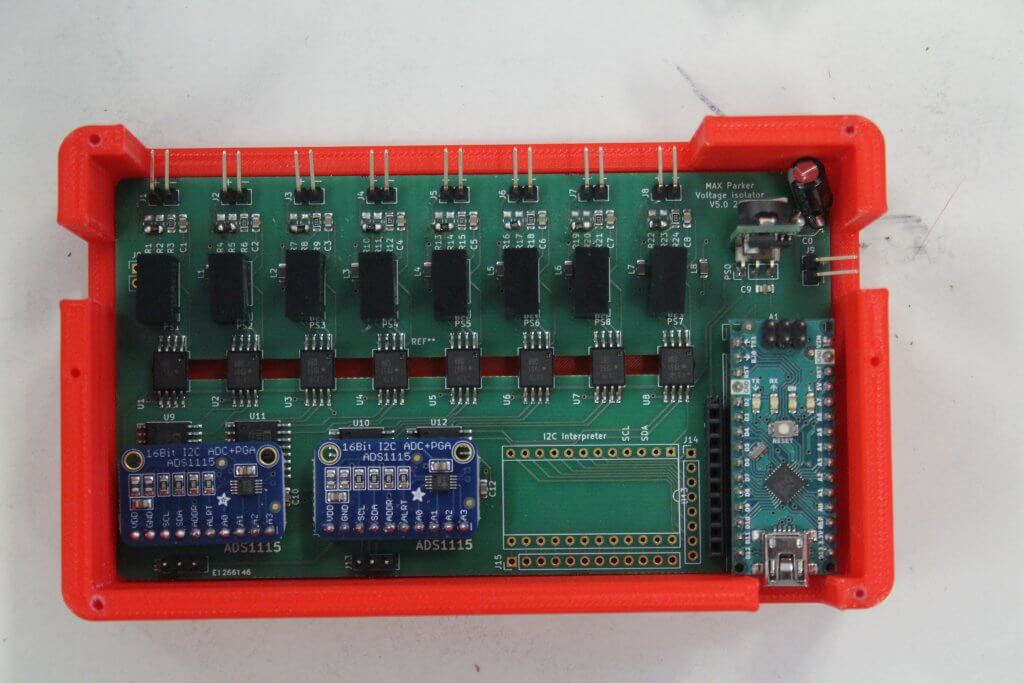
Europe’s energy storage transition over the last few years has witnessed tremendous growth, increasing from 0.55 GWh 2016 to 5.26 GWh by the end of 2020, with front-of-the-meter deployments such as utilities leading the way, representing more than 50% of installed capacity.
These energy storage systems require high-performing, reliable and affordable batteries to ensure the smooth generation and storage of energy for regional and national electrical grids.
Prof Richard McMahon from the University of Warwick said: “We are really pleased to be working with the CBI on the use of lead batteries in energy storage applications. Lead batteries have key benefits of safety and recyclability but there is work to be done to understand how best to manage lead batteries in energy storage service to optimize efficiency and prolong life.”
He added: “This knowledge will show owners and operators of storage facilities that lead-based systems provide a safe and cost-effective solution.”
By combining innovative research techniques such as electrochemical impedance spectroscopy, researchers will study and predict the performance and lifetime of lead batteries in various utility duty cycles.
"The availability of low-cost powerful microprocessors is fuelling an explosion in our capability to monitor, understand and impact battery degradation in real world situations at low cost,” said Prof Dani Strickland from Loughborough University.
“This project is exciting because it will use expertise in the partner organisations to transition lead batteries to the world of big data and smart energy storage," she continued.
The model developed by researchers will be compared to data gathered from actual lead batteries in the field, significantly aiding the understanding of how the technology is used in utility grid applications and how these factors impact battery lifetime.
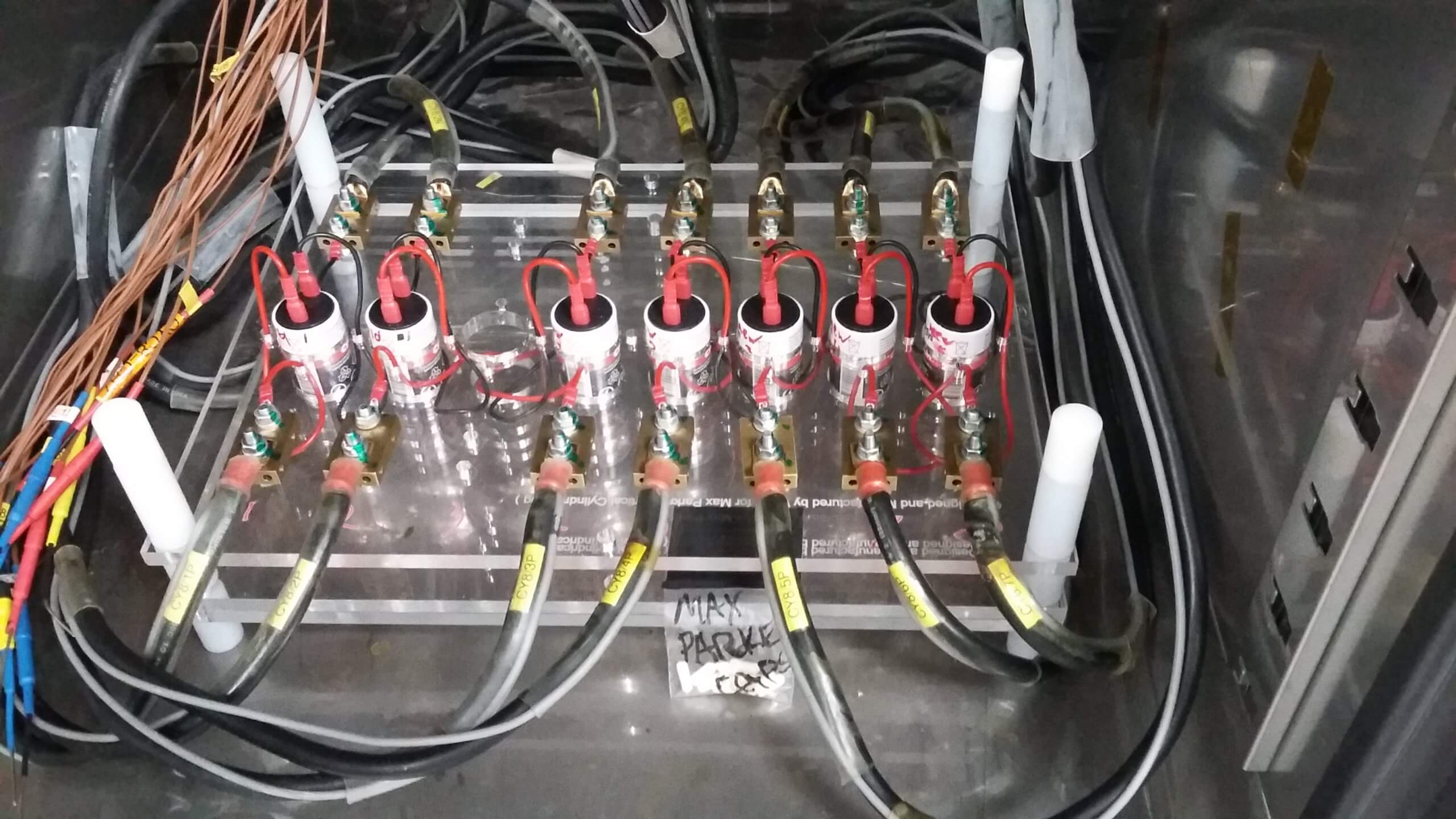
The research will be a critical part of the Consortium’s drive to achieve the technical performance goals for lead batteries set out in its technical roadmap by generating insights into how to control to maximize battery life in real-world energy storage installations.
CBI’s Technical Manager, Dr Matt Raiford, said: “This kind of collaborative research with universities is exactly what the lead battery industry needs. Working with leading institutions to deliver new insights and modelling techniques for lead battery energy storage is critical for the wider industry to continue their foray into the utility grid storage market.”
END
Notes to editors:
NEWS RELEASE
DURHAM, N.C. – March 15, 2021 - As part of the new suite of energy storage research projects launched by the Consortium for Battery Innovation (CBI), Hammond Group Inc. and East Penn Manufacturing have teamed up to meet the needs of the utility storage market.
Increased demand for energy storage in the utility sector has resulted in a broad spectrum of application developments for advanced batteries, with the global grid-scale stationary battery market predicted to exceed $40 Billion by 2030.
We are in the age of the battery. From frequency regulation where electricity grids are provided with higher levels of stability, to residential demand reduction to manage the cost of energy use, there is an extraordinary demand for batteries. By increasing flexibility in power systems, energy storage batteries are fundamental for the integration of renewable energy into the grid.
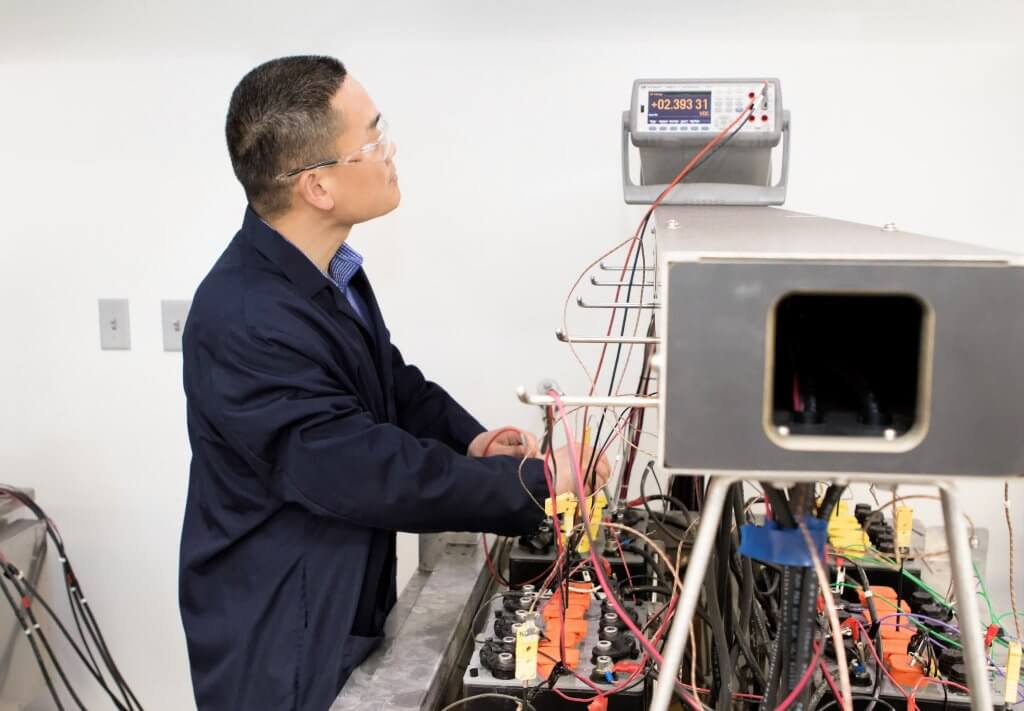
From North America and Europe to Asia, advanced lead batteries are being used by utilities to provide critical energy storage needs. And as a technology always innovating, the ground-breaking research collaboration with Hammond and East Penn will directly feed into market demand by studying vital electrode components in lead batteries to explore how they impact new performance needs.
For utility companies switching to batteries for storage, the key technical parameters required are enhanced cycle life and high performance at energy storage system duty cycles. For energy storage system applications, lead batteries are utilized at both partial-state-of-charge (PSoC) and in high depth-of-discharge (DOD), a demanding profile for any battery technology.
One of the key ways lead battery performance has been enhanced over its 150-year history to meet enhanced technical demand is through the use of expander additives in the electrode, such as barium sulfate. Hammond and East Penn’s research will explore how the additive size, treatment and morphology can be adapted to benefit duty cycles in a typical energy storage system.
Dr. Matt Raiford, Technical Manager at CBI, said: “This exciting research will be critical to increasing the cycle life of batteries developed to match those commonly used in energy storage systems. By studying the impact of different barium sulfate expander additives on electrode behaviour, new insights will be delivered into maximizing the performance of energy storage lead batteries.
“This will be critical for the expansion of lead battery uptake by utilities and renewable energy companies across the globe looking to add battery storage to their systems.”
As a global Consortium, the work of CBI is dedicated to fostering innovation in advanced lead batteries for the benefit of its membership and for wider market needs as identified in our technical roadmap. This novel research will deliver the best expander for energy storage applications, with a direct ripple-effect in contributing to the enhanced product performance for CBI’s membership.
Through synergy between research and manufacturing, the lead battery industry is innovating to adapt to evolving market demand and technical needs of societies across the globe. With rising demand for utility energy storage, the role of advanced lead batteries continues to be central for the global shift to a low carbon future by supporting the decarbonisation of the energy sector.
###
Notes to editors:
NEWS RELEASE
As the EU prepares to become a world-leader in sustainable battery technology and manufacturing, the Consortium for Battery Innovation (CBI) has launched a new European research project using neutron diffraction in a bid to improve the lifetime of energy storage batteries.
The hi-tech process, which images the entire crystal structure of the battery as it operates, allows battery experts to observe and control the processes impacting battery life and performance.
The project is being conducted in collaboration with the Instituto de Nanociencia y Materiales de Aragón (INMA) and EU-based battery company Exide Technologies. It is one of a range of advanced battery innovation studies underway funded by CBI.
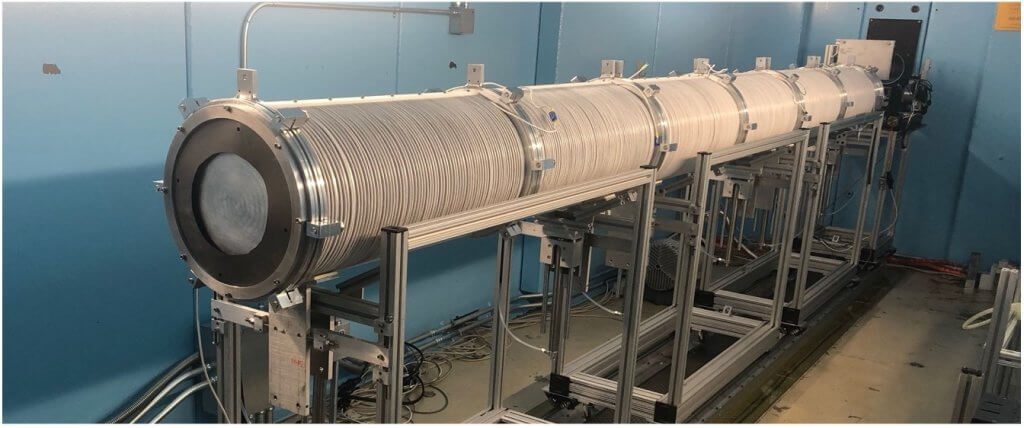
As countries target rapid carbon reduction in the battle to halt climate change, battery energy storage is set to be one of the defining technologies of the century, with demand predicted to grow to 20,000 MWh by 2025. Advanced lead batteries are a critical part of this landscape, with Europe home to leading manufacturing, recycling and research capability.
Scientists will be joining forces from INMA, a joint institute between one of Spain’s oldest universities, the University of Zaragoza, and the largest public research institution in Spain and third largest in Europe, the Spanish National Research Council (CSIC) and Exide Technologies, a global battery company through one of its R&D centres based near Madrid. They will study the fundamental processes that govern recharge efficiency and battery electrode failure using a suite of neutron beamline experiments.
Through a specific focus on battery electrodes, which transfer energy to and from the electrolyte in order to power the polarized device to which they connect, neutron diffraction will be used to study the batteries in operation across different duty cycles.
For energy storage applications, many of which incorporate renewable energy elements, advanced lead batteries operate at partial-state-of-charge (PSoC) and in high depth-of-discharge (DoD), both demanding duty cycles.
Director of CBI, Dr Alistair Davidson, said: “The ability to probe battery electrodes in real-time under typical energy storage duty cycles will deliver vital insights into how to enhance performance and the overall lifetime of the battery.
“This information is a critical part of our advanced battery research program which aims to ensure advanced lead batteries continue to innovate to meet heightened demand for clean, renewable energy storage across the globe”.
Neutron diffraction is capable of not only mapping the activity of the surface of the electrodes, but the entire electrode and electrolyte present in the battery. This provides a complete picture of how battery electrodes are changing at the micro-level, something never-before done in lead battery research.
By describing the electrode phenomena that govern battery lifetime, the research is generating new information on how to control the active material and maximize battery life in all applications for advanced lead batteries, a key goal in CBI’s technical roadmap.
Demand for clean energy storage continues to soar across Europe and further afield, and pioneering research will be significant in ensuring advanced lead batteries continue to innovate to meet the future technical requirements of these systems.
END
Notes to editors:
About Consortium for Battery Innovation:
About Exide Technologies:
Exide Technologies, (www.exidegroup.com), headquartered near Paris, France, is a leading provider of advanced energy storage solutions for the automotive and industrial markets. It designs, manufactures and markets today´s and next-generation battery technologies used across a wide range of applications, from automotive and off-road to material handling, stationary, rail and defense. Exide Technologies serves the global markets with top-notch battery technologies, know-how & added-value services under many well-known brands. As an original equipment manufacturer to leading automotive and industrial equipment manufacturers, Exide Technologies has been involved in many of the significant breakthrough energy-storage developments that are enabling innovation across the markets. With two R&D facilities, nine production plants and three recycling plants in Europe, Exide is committed to high-quality engineering, manufacturing and recycling, and continues to power the world with the most efficient energy solutions and helping customers maximize productivity and performance. In the fiscal year 2020, Exide achieved a turnover of 1.4 billion EUR.
About Instituto de Nanociencia y Materiales de Aragón (INMA):
The Aragon Nanoscience and Materials Institute is a Joint Research Centre created in 2020 by the Universidad de Zaragoza and the Spanish National Research Council (CSIC) as a result of the merging of the Instituto de Ciencia de Materiales de Aragón (founded in 1985) and the Instituto de Nanociencia de Aragón (founded in 2003). Hosting around 300 members, INMA covers four key research topics (materials for energy and environment, materials for biomedicine, materials for ICT, and new nanoscale phenomena) and two enabling research areas (synthesis, processing and scaling-up of functional materials, and advanced experimental technologies). INMA has wide experience in participating and managing national and international research projects (more than 30 ongoing EU projects) and works closely with industry through private contracts. INMA researchers and Exide have been working in collaboration since 2015 to improve the efficiency of the charge-discharge cycles in order to extend the cycle life of the batteries.
NEWS RELEASE
DURHAM, N.C. – February 25, 2021 - Engineers at Gridtential Energy, Inc. and Electric Applications Incorporated (EAI), supported by the Consortium for Battery Innovation (CBI), are working to further develop quick and safe ‘plug and play’ solar powered energy storage systems to meet the boom in demand for renewable, and secure, energy in U.S. homes.
Gridtential Energy is the pioneer of Silicon Joule™, an innovative bipolar battery technology, which uses silicon wafers (similar to those in solar cells) in traditional lead batteries to reduce weight and achieve performance competitive with lithium-ion at a lower cost. The new research project will combine Silicon Joule technology with the testing expertise of EAI to develop high voltage reference batteries specifically for so-called behind-the-meter energy storage applications.
The advanced batteries developed by Gridtential and EAI could accelerate the move to greener power in homes across the nation as the new U.S. president drives forward climate change policies and the low carbon transformation of the economy.
Behind-the-meter (BTM) energy storage is a critical piece for the decarbonization landscape with systems booming in demand. In the U.S. alone, Wood Mackenzie predicted 430 MW installed in 2020, reflecting an increase of more than 100% over 2019.
This is driving the need for affordable, safe, high-performing batteries in easy-to-connect packages that incorporate renewable energy for the residential market.
John Barton, CEO of Gridtential, said: “Integrated PV-battery backup system is a fantastic application for Silicon Joule technology due to its superior cycle life, low cost, safety, and recyclability; all of which are of utmost importance to residential consumers and small business owners and set this technology apart from other batteries.”
The research collaboration will involve constructing mini-systems using Silicon Joule bipolar batteries for testing, with EAI developing an optimized charge scheme to replicate real-life energy storage systems.
Building on CBI’s technical roadmap goals to maximize cycle life and energy throughput - two key technical parameters for renewable energy storage - this project is critical for delivering insights to enhance lead battery performance.
Dr. Matt Raiford, Technical Manager of CBI, said: “This exciting partnership will delve into the performance of bipolar lead battery packs using sizing commonly seen in residential energy storage systems.”
“Demand reduction and renewable energy storage applications are a booming market for advanced lead batteries and the most popular in the residential sector” he added. “This project will contribute to a new battery technology being available to meet growing demand in the United States and further afield”.
As part of CBI’s 2021 research program dedicated to enhancing lead battery performance under the banner of energy storage, the project with Gridtential and EAI is pushing the boundaries to deliver next-generation batteries.
###
Notes to editors:
NEWS RELEASE
Investment in battery research is key to reducing carbon emissions and boosting electrification, according to the newly appointed chairman of global battery research hub the Consortium for Battery Innovation (CBI).
Dr Christian Rosenkranz is calling on governments and industry to work more closely to help accelerate the development of advanced battery technologies.
Dr Rosenkranz, who is Vice President Industry and Governmental Relations EMEA of CBI member and battery manufacturer Clarios, said: “We need to see a huge uplift in rechargeable battery energy storage if countries are to get anywhere near the global targets for reducing carbon emissions. As we approach the COP26 talks later this year we should be pressing for more commitments to support battery research into new and existing technologies in partnership with industry.

“At the Consortium we are conducting and supporting innovative research projects in Europe, the United States and Asia which will significantly improve the performance of advanced lead batteries. But we need to see a concerted effort to support further research efforts to support high-performance, reliable and cost-effective batteries for the future.”
A long-standing member of the lead battery industry, Dr Rosenkranz aims to build on the success of CBI since its formation in 2019. He said: “It’s an exciting time to head a consortium which has already made great strides in driving global innovation in lead battery technology across all applications.”
Dr Rosenkranz replaces Dr Tim Ellis, of RSR Technologies, CBI’s inaugural chairman.
“I’m grateful to Dr Ellis for his pivotal leadership in helping ensure CBI plays a vital role in demonstrating the innovation potential of lead batteries around the world” Dr Rosenkranz said.
Clarios, a global leader in automotive batteries, is actively supporting the electrification of the automotive power train with the advanced lead batteries they design and manufacture. The universal introduction of AGM (Absorbent Glass Mat) batteries provides optimal performance in the automotive environment and Clarios is leading development and innovation in the technology through four global R&D centers to optimize the capture of recuperative energy in vehicles.
Driving the research underway at CBI is a technical roadmap which is at the forefront of delivering performance enhancements for lead batteries. Identifying the highest priority research goals for lead battery technology, Dynamic Charge Acceptance (DCA) is a performance enhancement crucial for the growing micro-hybrid market, predicted to represent over 80% of European car sales by 2030.
Director of CBI, Dr Alistair Davidson, said: “DCA is the ability of batteries to store instantaneous energy in a vehicle and is a vital part of what makes start-stop and hybrid vehicles more fuel efficient and emit less CO2. Improving DCA is a central research pathway for CBI and one which is critical for both Clarios and the whole industry”.
CBI is working with researchers, testing institutes, battery manufacturers and automotive companies across the globe to achieve the market-driven research goals which will be critical for lead batteries to continue their crucial contribution to a low carbon future. The current technical program is demonstrating exciting routes for improving DCA by up to 40% and showing how tools such as battery management systems can significantly improve cycle life, a key technical parameter for energy storage applications.
The suite of technical projects being conducted in collaboration with CBI not only drive automotive battery improvements but are also leading the way in energy storage battery research. The new technical program due to be announced this year will have a strong focus on this emerging market where lead batteries are utilized around the world to support utility and renewable energy storage and CBI’s role beyond research is connecting the storage sector with high-performing lead batteries for systems such as through the online CBI Battery Match tool.
Clean mobility and clean energy are central pillars in facilitating Europe’s shift to become climate-neutral by 2050, and batteries remain a central part of this as they continue to innovate to meet evolving demand for reliable, sustainable and high-performing batteries.
END
Notes to editors:
+++
NEWS RELEASE
A ground-breaking new project is probing how mixing common additives using different ratios could enhance the performance of hi-tech lead batteries commonly used in micro-hybrid and hybrid cars.
It is hoped the research will further improve the overall performance of the battery and reduce carbon emissions in start-stop, micro and mild hybrid vehicles. By 2030, 60% of global car sales are predicted to be micro-hybrids, with rates in Europe and the U.S. expected to be even higher.
Some of biggest players in the global lead battery industry are collaborating with the Consortium for Battery Innovation (CBI) to support the research: battery manufacturer and recycler East Penn Manufacturing and materials suppliers Hammond and Cabotand Borregaard Lignotech.
For nearly a decade, carbon has been a well-known and proven additive material used to improve performances in lead batteries. Adding carbon into an electrode, or as the main composition material for the negative electrode, provides a reliable and simple pathway for performance improvements in lead batteries for cycle life, lifetime and dynamic charge acceptance (DCA).
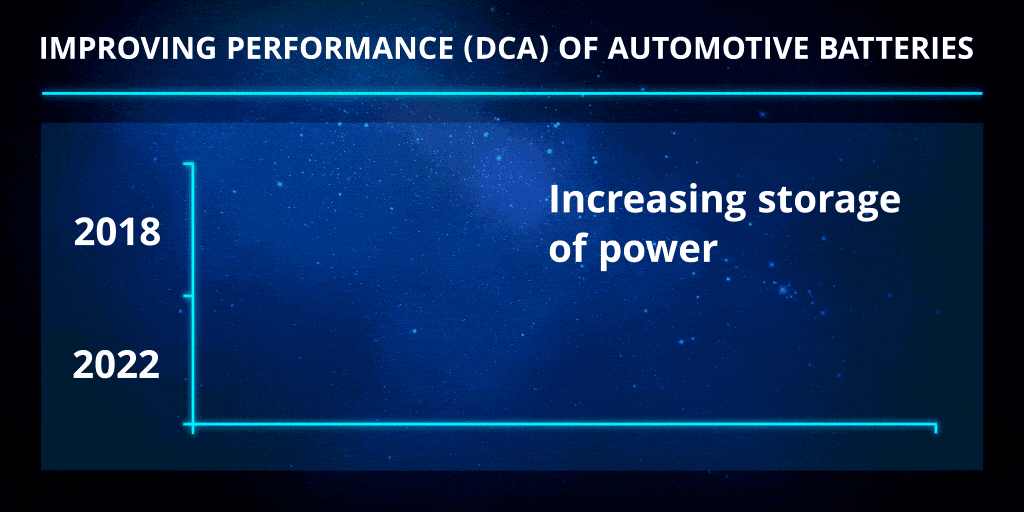
For the first time, this cutting-edge project will systematically study different ratios of the common additives used in the industry: carbon, lignosulfonate and barium sulfate, with the overall objective of optimizing DCA and performance at partial state-of-charge (PSoC).
Director of CBI, Dr Alistair Davidson, said: “This kind of collaborative research can really make a difference to the performance of batteries and we are hoping to push the boundaries of this incredible technology even further with the results of our work.”
Building on the launch of CBI’s technical roadmap in 2019, which identified DCA as one of the highest priority research goals, this project will contribute to supporting innovation in lead battery technology to meet the ever-growing demand for clean mobility.
DCA, which is the ability of a battery to accept instantaneous energy during charging, for example from regenerative braking, is crucial for maximizing the performance of advanced lead batteries in the ever-increasing number of micro and mild-hybrid vehicles on the road.
Understanding how carbons interact with other additives, such as lignosulfonates, is an area of research which can provide significant new insights and propel innovation in the next generation of advanced lead batteries, ensuring future demand for clean mobility is met.
END
Notes to editors:
About CBI:
NEWS RELEASE
The new research – an EU collaboration managed by the Consortium for Battery Innovation – will focus on dynamic charge acceptance (DCA) and high-temperature durability in batteries used in the automotive sector. DCA is ability of a battery to capture instantaneous energy such as through regenerative braking.
The European research partners include Ford Research and Innovation Center based in Aachen, Technische Universität Berlin (TU Berlin), MOLL Batterien and Fraunhofer Institute for Silicate Research ISC with its R&D Center Electromobility FZEB.

CBI’s global director Dr Alistair Davidson said: “The EU has a world-leading lead battery manufacturing capability and we have brokered this research collaboration with some of the most respected technical institutions in Europe to create advanced batteries that support a low carbon future. Regenerative braking using advanced lead batteries is key to achieving lower carbon emissions from cars and other vehicles. This project will help battery manufacturers improve the fuel economy and CO2emissions of hybrid vehicles.”
Ford’s Technical Specialist Dr Eckhard Karden said: “Car battery technology requires constant innovation and the work we’re doing at Ford will ensure that we use the most advanced lead batteries in our vehicles, ones that support the transition to a low carbon economy in hybrid vehicles.”
“In this project the Consortium for Battery Innovation and our European partners are helping to keep lead battery innovation at the forefront of technological improvements.”
The 18-month project will focus on performing a range of experiments on lead battery test cells, which are small laboratory versions of full-size batteries. The project will provide a thorough exploration of cell practices by exploring additive effects on DCA and high-temperature durability.
Taking the research a step further, the information gained from these screening studies will be essential for developing more accurate testing and methods to demonstrate enhancements in performance metrics such as DCA.
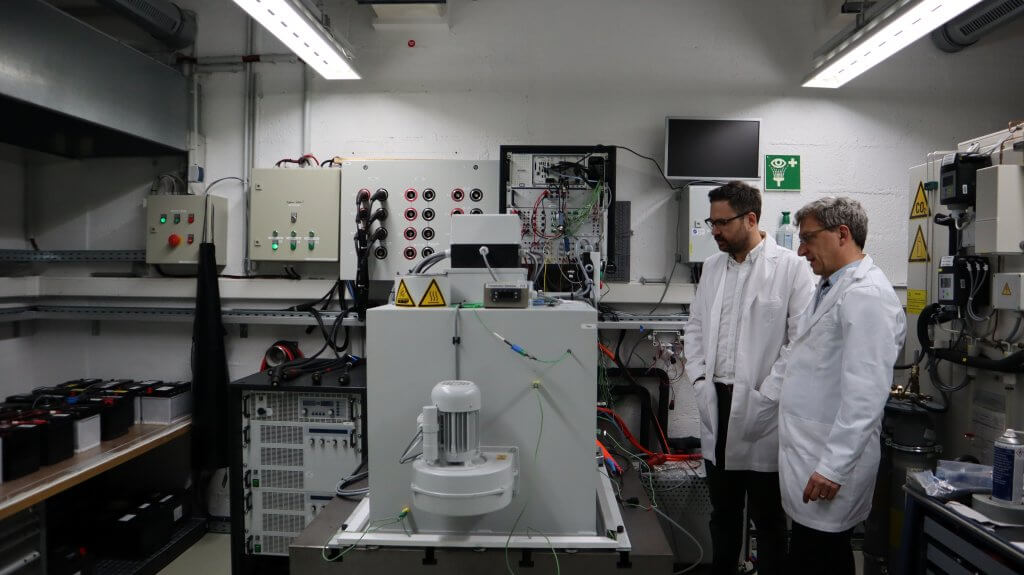
This information is essential for improving DCA of lead batteries for micro and mild-hybrid vehicles, a market expected to represent 80% of new vehicles in Europe, and over 60% globally by 2030. Lead batteries play a crucial role in this market by providing power for the essential functions on board such as starting, lighting, ignition (SLI), in addition to critical safety features such as driver assistance and autonomous driving functions. Advanced lead batteries in micro-hybrid vehicles are also able to store the energy generated during regenerative braking, delivering up to 10% in fuel savings and carbon emission reductions.
Over the last few years, CBI has been leading efforts to create a forum where the world’s leading lead battery manufacturers, car companies and researchers come together to discuss, explore and research the fundamental questions applicable to improving automotive lead batteries. The fusion takes place in DCA & Heat Workshops with the aim of optimizing high-temperature durability tests for advanced lead batteries. This work in crucial to determining pathways for improving DCA of lead batteries, and also developing tests demonstrating the strides in performance underway in the technology.
The Fraunhofer ISC, as experts in material development and electrochemical analysis, will investigate the effect of specially designed carbon additives on high-temperature durability. TU Berlin’s tasks will involve electrical tests on cell level as well as modelling, whilst MOLL, as a leading producer for enhanced flooded batteries (EFB), contributes with electrodes and knowledge regarding experimental test cells. Ford will provide the battery test data as well as vehicle integration background.
This latest research project between Ford, MOLL, Fraunhofer ISC and TU Berlin aligns well with efforts spearheaded by CBI to propel the next generation of advanced lead batteries for automotive applications. The knowledge generated from this research project will also feed into CBI’s growing research focus on lead batteries utilized in renewable energy storage applications as the batteries can have similar duty cycles to micro and mild-hybrid vehicles.
The project is part of the greater CBI technical program where the expansion of our research portfolio has involved adding projects applicable to energy storage systems for utility services. The renewable energy sector is a fast-growing area for lead batteries and an increasing number of installations are utilizing the technology for applications such as peak shaving, microgrids, frequency regulation and tariff management. CBI’s research program is focused on improving the cycle life of lead batteries for these applications which contributes to a lower TCO (total cost of ownership), a key requirement for batteries in ths application.
END
Notes to editors:
About CBI:
NEWS RELEASE
Driven by demand for high-performing batteries for the growing start-stop and micro-hybrid automotive market, a new European research collaboration between two leading academic institutes will use tailor-made carbons and utilize advanced physical and electrochemical techniques to study key performance indicators for lead battery technology.
The partnership between the Fraunhofer Institute for Silicate Research (Fraunhofer ISC) and Wrocław University of Science and Technology (WUST) has been facilitated by the Consortium for Battery Innovation (CBI), the world’s only research hub dedicated to advanced lead battery technology.
Dr Alistair Davidson, Director of CBI, said: “Responding to market demand from the automotive sector, this new research project is building on collaborative workshops organized by the Consortium in partnership with OEMs and car companies over the last few years.”
“It’s one of a new set of exciting projects aiming to enhance the performance of lead batteries to meet the technical requirements of start-stop and micro-hybrid vehicles.”
The 2-year project involves Fraunhofer ISC, a long-standing partner of the Consortium and one of the leading Bavarian centers for material-based research and development in the fields of energy, environment and health, and WUST, one of Poland’s leading technical universities.
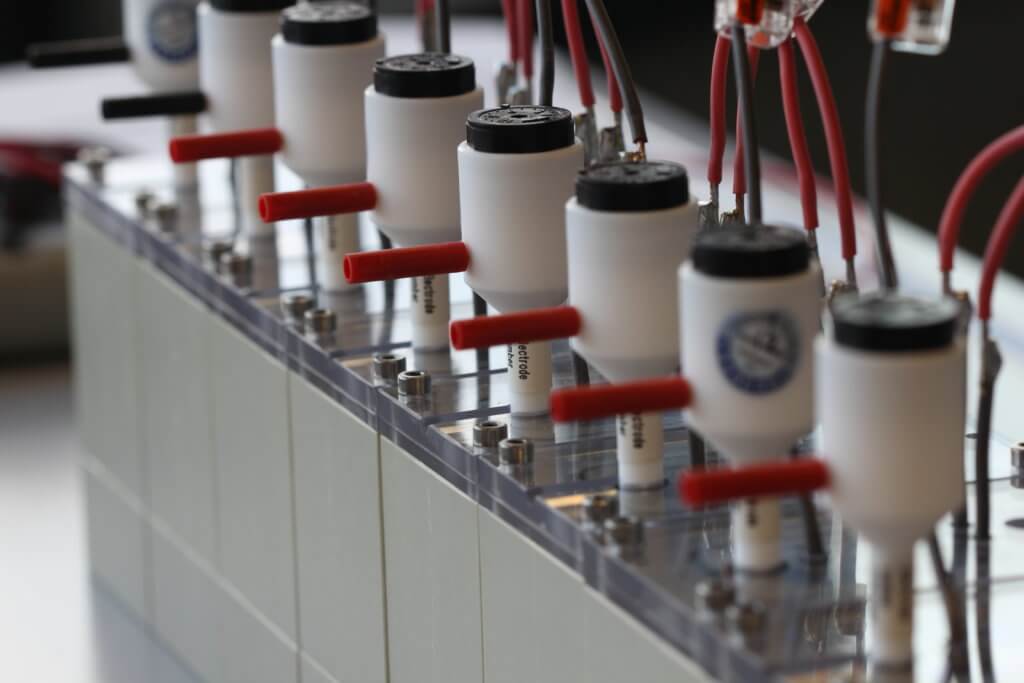
The research project will explore the fundamental properties of carbon additives with focus on surface functional groups, and the effect they have on lead battery performance. Specifically, it will look at the impact on key performance indicators in lead batteries:
Studies of these three performance indicators will utilize screening techniques combined with tailor-made carbons to examine how carbon chemistry interacts with lead and other common additives.
Carbons are a popular additive for enhancing battery performance, and this research project is building on existing research by using innovative techniques to conduct in-depth exploration of additive effects.

This knowledge is essential for improving the DCA of lead batteries and increasing their uptake in start-stop, micro and mild-hybrid applications, one of the fastest growing automotive markets worldwide and a vital market for delivering cleaner mobility.
CBI’s technical roadmap has identified improving DCA performance as one of the vital research goals essential to continuing the innovative advancements in lead battery technology for both energy storage and automotive applications.
END
Notes to editors:
About CBI:
A ground-breaking new battery ‘match’ service is set to help utility companies choose the most suitable batteries as partners for their energy storage schemes.
CBI Battery Match has been designed and built by the Consortium for Battery Innovation (CBI) – the global advanced lead battery research group – to help electricity providers and other energy storage projects find a battery system that best meets their requirements.
The online service, launched in conjunction with the Energy Storage Association’s Virtual Conference (ESACon20), is targeted at systems specifiers and integrators for utility and renewable energy companies and presents them with a series of potential battery partners, before linking them directly with battery manufacturers.
Just like human dating apps, users tap in information about themselves together with details of their expectations and requirements. Using an intelligent algorithm based on battery industry expertise, a range of battery solutions best suited to their needs are identified in real-time.

Dr Alistair Davidson, Director of CBI said: “We’re aiming to bridge the gap between utilities and renewable energy providers and battery manufacturers by demonstrating the wide range of reliable, high-performance advanced lead batteries available.
“Our research Consortium of battery manufacturers has found that their customers needed a simpler way to sort through the range of choices to identify the best battery for their energy storage system.
“Our battery matchmaker will help demonstrate that there are a range of options available, where advanced lead batteries are best-suited to their needs, that allows them to find a tailor-made solution for their specific system.”
“We’re seeing massive growth in demand for battery energy storage across the globe which means we need many more batteries. This new tool helps users consider the range of potential solutions and puts them in touch with potential partners in the shape of the manufacturers.”
With the energy storage market expected to grow at nearly 25% in the next five years, batteries will be one of the key energy storage technologies.
“All battery chemistries will have a part to play achieving future clean energy targets.” added Dr Davidson. “One of the advantages of using advanced lead batteries is that they combine reliability, high technical performance and cost-effectiveness with a recycling rate of almost 100% in North America and Europe.”
The technology is already widely used by utility and renewable energy companies for projects ranging from large-scale peak-shaving and frequency regulation projects to microgrids and off-grid systems.
The battery match service is a collaborative effort between the lead battery industry and CBI, which brings together robust, technical information from some of the leading global players in one place. Companies including Advanced Battery Concepts, C&D Technologies, East Penn Manufacturing, Electric Applications Incorporated, EnerSys, Exide Technologies, Gridtential, NorthStar Battery and Trojan Battery Company are engaged in the project.
With a user-friendly interface available on desktop and mobile, energy storage end-users can log on to the tool, input their system requirements, and the outcome is a direct match with the battery best suited for their project. CBI Battery Match will enable direct communication between the energy storage company and the battery manufacturer, a streamlined process where inputted information results in the output of a battery.
END
Notes to editors:
About the Consortium for Battery Innovation:
NEWS RELEASE
A team of scientists from the University of California is set to unlock the inner workings of lead batteries with the help of nanoscale technology.
Working with the Consortium for Battery Innovation (CBI), the new industry-academia partnership based in Los Angeles will explore the fundamental processes occurring inside lead batteries as part of the Consortium’s plans to deliver performance improvements in the technology for the growing automotive and utility grid storage sectors.
The University of California, Los Angeles (UCLA) will use an innovative implementation of Scanning Transmission Electron Microscopy (STEM) that allows researchers to observe the crystallization and dissolution of the phases involved in the charge and discharge of a lead battery during operation at the nanoscale.

This pioneering work, spanning 18 months, will provide deeper understanding into sustaining these materials to deliver improved battery performance and longer lifetimes.
Prof. Chris Regan, who leads the research team from UCLA said: “Lead batteries have been a mainstay technology for more than a hundred years, but there is a significant amount that is still to be understood about the fundamental reactions occurring in this chemistry. We believe this new technique will help unlock new technological data to improve the performance potential.”
Dr Alistair Davidson, Director of CBI, said: “This kind of fundamental research is key to designing the next generation of advanced lead batteries. As demand grows for ever more sophisticated and high-performance rechargeable batteries, we are ensuring that the science supports new innovation.”
Rapid technological advances and falling costs for installed grid battery storage underpin predictions that energy storage in the U.S. alone will reach 100 GW of new energy storage by 2030. By providing flexibility for the grid and protecting against vulnerabilities, the role of batteries is central to the transition to low-carbon energy systems across the globe.
As the world’s only pre-competitive lead battery research hub, research undertaken by the Consortium has a ripple effect allowing its global membership of battery manufacturers, recyclers, material suppliers and testing institutes to benefit from new insights gained through its extensive suite of technical projects.
As demand continues apace for high-performing batteries for clean mobility and more reliable utility grid storage, CBI is undertaking groundbreaking research to continue to push the boundaries of advanced lead battery technology, building on the key research goals set out in its technical roadmap.
END
Notes to editors:
About CBI:
NEWS RELEASE
One of the latest technology developments in lead batteries will undergo well-known automotive testing standards in a research project collaboration between Advanced Battery Concepts (ABC) and the Consortium for Battery Innovation (CBI).
Bipolar lead battery technology, which has been tipped to deliver improved dynamic charge acceptance (DCA) performance, will be independently verified by ABC using specific global automotive testing regimes verified by the scientific community.
Advanced Battery Concepts, a battery technology development company based in Michigan, US, will test their own bipolar lead batteries which have thinner enhanced positive and negative paste, specially developed for start-stop, micro and mild-hybrids. As a market estimated to represent 80% of automotive vehicles by 2030, the ability of bipolar lead batteries to deliver enhanced performance in these applications is ground-breaking.
This cutting-edge automotive battery research undertaken by ABC in conjunction with CBI aims to verify the DCA performance benefits of this technology, which is the ability of a battery to generate instantaneous energy in automotive applications, for example through regenerative braking.
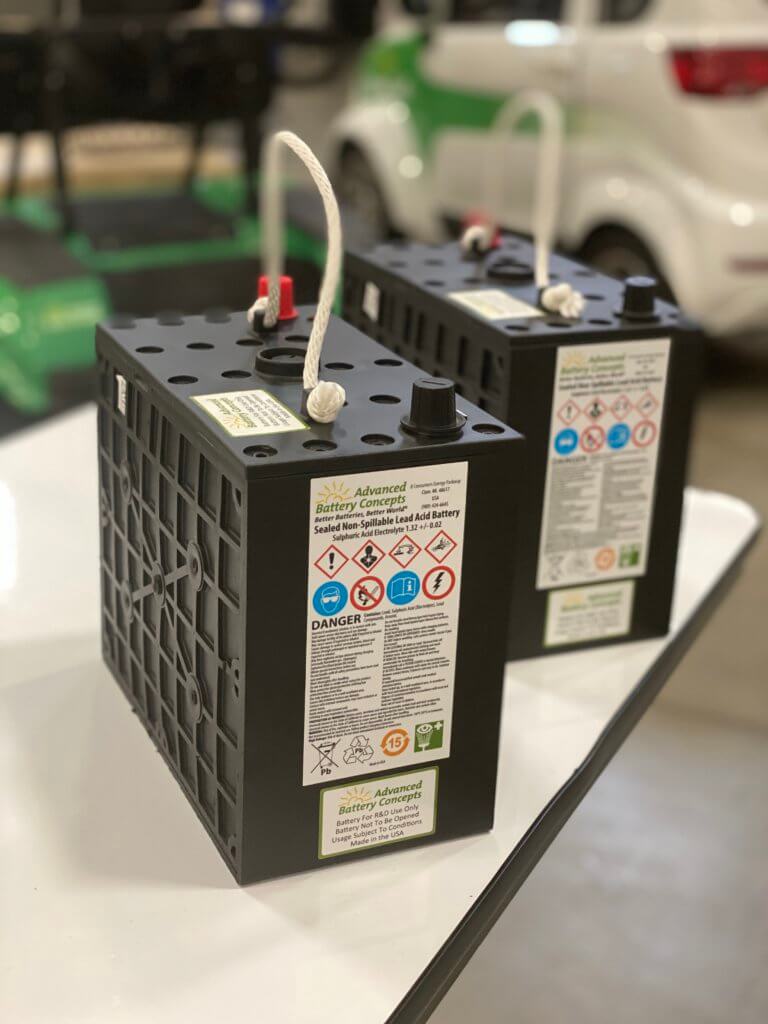
Ed Shaffer, CEO of ABC, said: “We expect the micro and mild-hybrid market to grow substantially in the coming years. We think bipolar is an exceptional technology for use in this market with improved DCA performance, a key technical parameter for this application, and this project will be key in demonstrating these capabilities”.
By benchmarking performance against known standards, this could be a starting point for this technology to be rolled out across the lead battery industry as a proven technology and facilitate new avenues of research in bipolar lead batteries.
The 9-month project will also include tests for partial state-of-charge (PSoC) performance, a key requirement not only relevant for start-stop, micro and mild-hybrid vehicles, but will also provide vital insight into the capabilities of bipolar lead batteries for storing energy from intermittent renewable sources such as wind and solar applications.
“The dual nature of this research project delivers on the priority research targets set out by the Consortium to improve the performance of lead batteries in both automotive and energy storage applications to grasp future market opportunities in these sectors” said Dr Alistair Davidson, Director of CBI.
END
Notes to editors:
About CBI:
About Advanced Battery Concepts:
Advanced Battery Concepts LLC is a global battery technology development company based in Michigan, USA, and is the first company to successfully design a bipolar lead acid battery and develop and implement a commercially viable manufacturing process for such batteries. Advanced Battery Concepts is currently working with existing lead acid battery producers and engaging licensees to realize the commercial potential of its technology, as well as on-going production of batteries and additional research from its Battery Research & Engineering Development Centre in Michigan to broaden its technology portfolio. For more information, visit our website: Advanced Battery Concepts
NEWS RELEASE - 4 May 2020
A research project designed to balance electrical current across banks of advanced lead batteries supporting wind and solar systems has been launched in Arizona, US.
The 18-month study, by Arizona-based Electric Applications Inc (EAI), is one of a range of innovation projects backed this year by the global research group, the Consortium for Battery Innovation (CBI).
It will take an in-depth look into how balancing the electrical current across large strings of batteries can improve cycle life, which is the ability of a battery to continue working through numerous cycles when it is not fully charged. Improving cycle life will also help reduce the overall cost of the energy storage system, reducing the need for replacement batteries, a key consideration for utility and renewable energy providers.
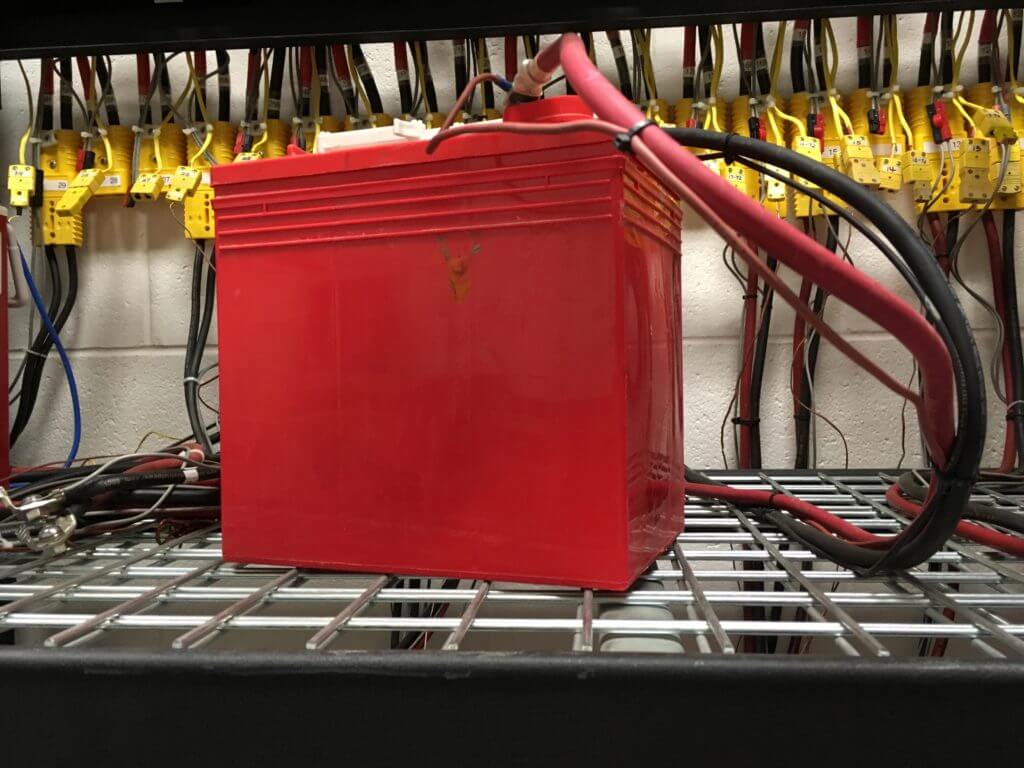
EAI’s President, Don Karner, said: “We’ve seen a massive growth in demand for batteries for renewable energy storage and the cost and safety of advanced lead batteries make them the ideal choice for many applications. Our aim is to help extend the cycle life of these battery systems by closely managing charge and discharge of batteries at a series string level. These are effectively new forms of battery management systems designed specifically for lead battery based renewable energy systems.”
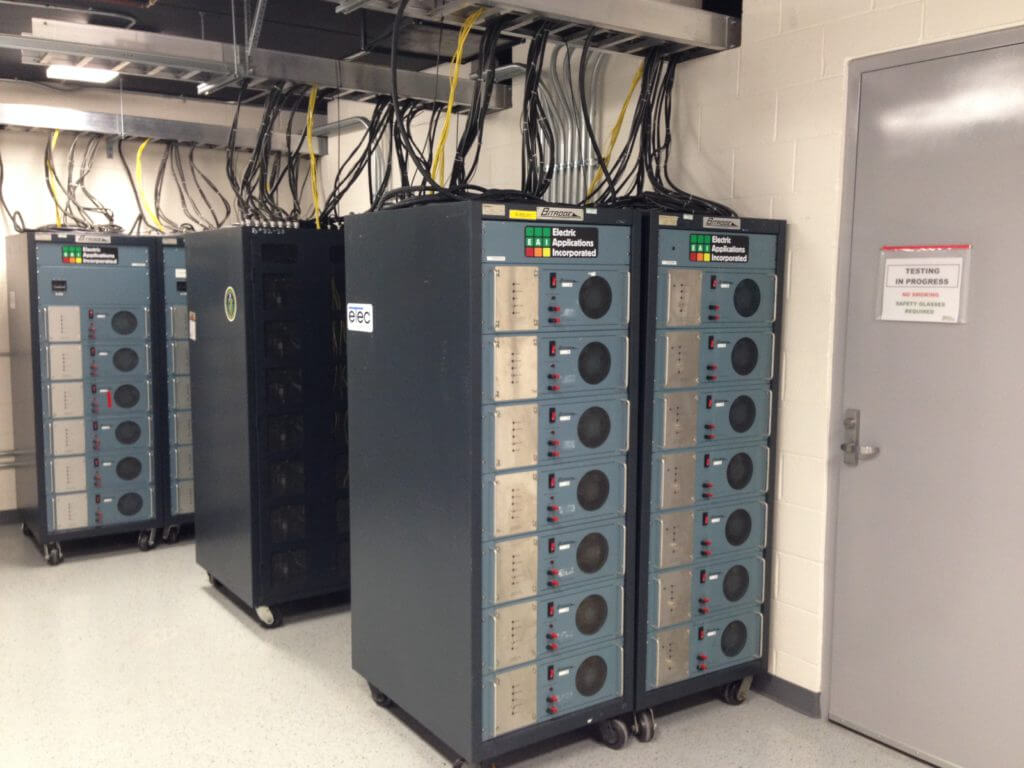
Dr Alistair Davidson, Director of CBI, said: “This kind of research is taking advanced lead battery technology to a new level by marrying intelligent battery management systems with banks of battery storage units. Lead batteries are particularly useful in microgrids and in managing peaks and troughs in demand, such as those experienced in renewable energy systems. The Consortium is bringing together a range of research projects all of which effectively aim to improve and extend the life of batteries which are known for being cost-efficient and safe options.”
Energy analysts Wood Mackenzie have predicted a thirteenfold increase in grid-scale storage in the next six years. Grid energy storage stores energy in time periods where electricity is abundant and inexpensive or when demand is low. It is then supplied back to the electrical grid when demand is high or electricity prices are higher, allowing a more efficient and economical transfer of energy.
Battery energy storage for this purpose has been vital in the global move to cleaner, renewable sources of energy where the intermittent challenge of solar and wind power generation has been overcome by storing power in batteries during these times.
END
Notes to editors:
About CBI:
NEWS RELEASE - 16 March 2020
A new request for research proposals to support advanced battery technology innovation in energy storage systems has been launched by the world’s only pre-competitive lead battery research consortium.
For the first time, the Consortium for Battery Innovation (CBI), which promotes cutting-edge research and innovation in advanced lead batteries, is seeking research bids focused on facilitating the latest understanding in energy storage applications such as microgrids for renewable energy, load following for electrical grids, and demand response for commercial and industrial applications.
As demand for battery energy storage continues to grow, and the demand for flexible and cleaner sources of energy to supply energy to the grid increases, battery technologies have been recognized as a cornerstone in achieving sustainable decarbonisation and electrification goals. Predictions from the International Renewable Energy Agency (IRENA) say 150 GW of storage using batteries is needed by 2030 to achieve renewable energy targets.

Building on the launch of CBI’s technical innovation roadmap last year, which set out the highest research priorities for the next five years into continuing innovation in lead batteries for applications such as the global automotive and motive sectors, this year’s research requests is focusing on identifying new pathways to continue the improvements in lead battery performance for energy storage systems.*
Dr Matthew Raiford, manager of CBI’s technical program, said: “Innovation is the lifeblood of our industry and each year we push the boundaries of research in lead battery technology. We’ve made great progress in the last 12 months with our rolling research program so we’re opening up the opportunity for universities, companies and other research institutes to submit proposals for a new wave of research projects. We know that demand for battery supported energy storage is growing exponentially and innovation in our technology needs to keep pace with this growth.”
CBI’s technical innovation roadmap set out the highest priority research goal of increasing cycle life of lead batteries for energy storage applications by five times to 5,000 by 2022, a key technical parameter for renewable and utility energy applications.
As a newer application for lead batteries, research into field and laboratory tests for energy storage systems is essential to gain deeper insights into understanding total energy throughput and increasing service life and performance.
Whilst demand for clean, reliable, battery energy storage continues to grow, this demand cannot be met by one technology alone. Fundamental research into lead batteries will be vital in exploiting the untapped potential of this technology to deliver on the global transition to a sustainable energy system.
ENDS
Notes to editors:
The first battery innovation project in Europe using hi-tech neutron diffraction techniques has been launched in Spain under the Consortium for Battery Innovation’s (CBI) new technical program.
European consortium member Exide Technologies has partnered with the Institute of Materials Science of Aragon (ICMA) to explore fundamental processes occurring inside lead batteries during operation, using neutron diffraction, with the overall objective of improving life cycle and performance. ICMA is a joint institute between one of Spain’s oldest universities, the University of Zaragoza, and the largest public research institution in Spain and third largest in Europe, the Spanish National Research Council (CSIC).
Dr Alistair Davidson, Director of CBI said: “This project, the first to be launched in Europe, demonstrates the the kind of cutting-edge research now being undertaken by the advanced lead battery industry to ensure our reliable and high quality batteries continue to play a central role in delivering Europe’s new Green Deal and support the creation of a climate-neutral continent by 2050.”
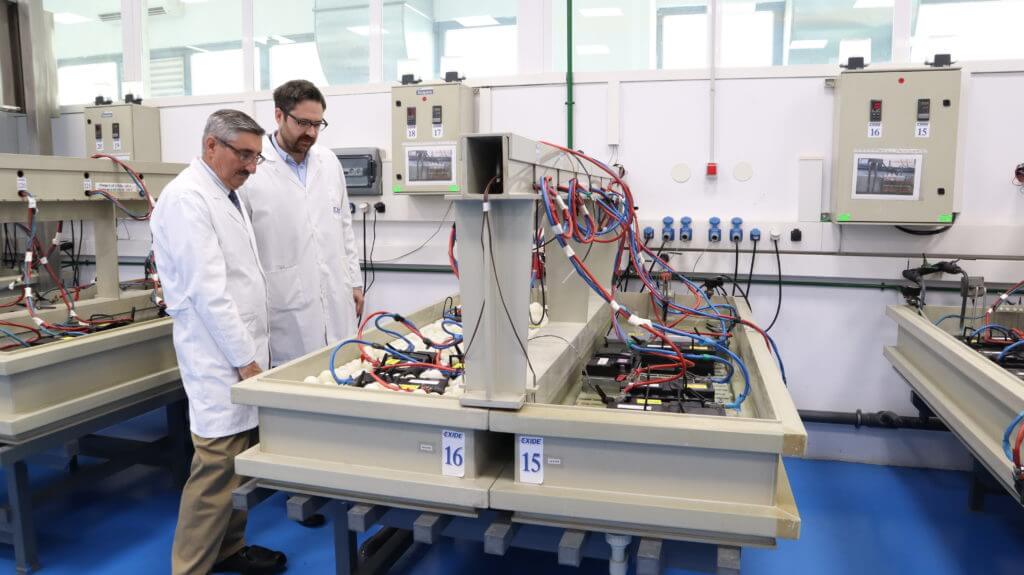
“Neutron diffraction probes deeper than x-rays and can
provide another perspective into improving the performance of lead batteries.
The analysis we’re conducting in Spain will help us develop new high-performing
lead batteries.”
Dr Francisco Trinidad, Director Battery Technology of Exide said: “The new project follows a feasibility study which demonstrated the capabilities of this technique in relation to achieving lifetime improvements in lead battery performance. Exide and ICMA’s new research project can facilitate the understanding of processes governing battery failure during operation through neutron diffraction.”
The second stage of this project will be an analysis of the results, opening up future opportunities to examine lead batteries using neutron diffraction. By using various techniques to gain a deeper understanding of lead battery performance, research being undertaken by CBI with its members and partners will push the development of this technology in key areas such as lifetime.
CBI’s new technical program aims to increase battery cycle life by 5 times by 2022 to 5,000 cycles for energy storage applications. Cycle life is the ability of a battery to continue working through numerous cycles when it is not fully charged and improving performance in this area would contribute to lower operating cost, a key parameter for utility and renewable energy applications.
For the automotive sector, the highest priority target research goal is to increase DCA by 5 times by the year 2022 to 2 Amps/Ah. DCA, which is the ability of the battery to accept instantaneous energy during charging, for example when braking, will be crucial for maximizing the performance of advanced lead batteries in the ever-increasing number of micro and mild-hybrid vehicles on the road.
As the only pre-competitive research Consortium dedicated to the advancement of lead battery technology, CBI develops and funds research programs, working with leading universities, research institutes and companies involved in the global lead battery value chain.
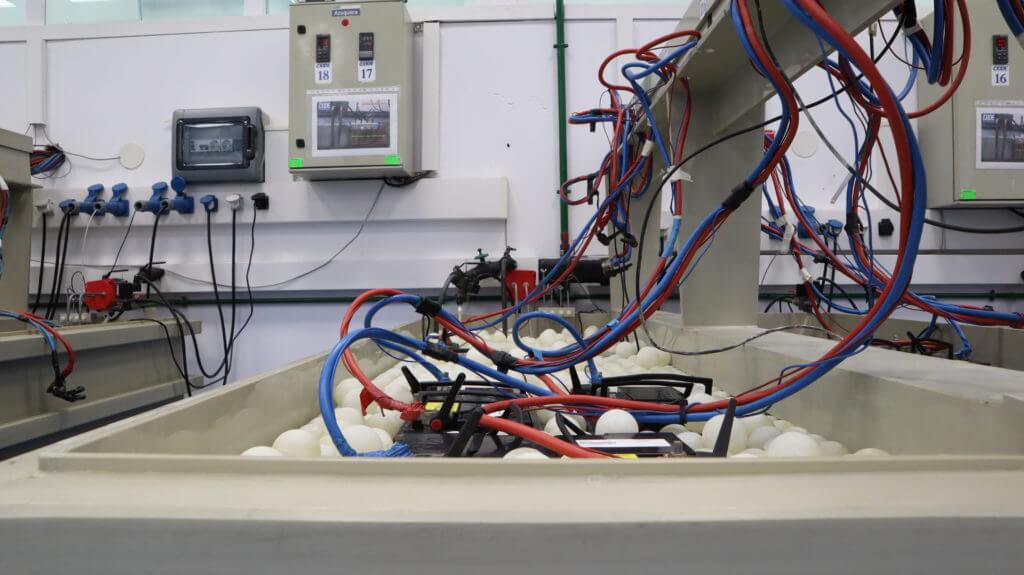
Working in tandem with CBI’s newly launched technical roadmap, the new technical program focuses on projects that will advance, develop and drive the next generation of lead batteries for a range of applications such as energy storage and automotive.
In 2018, CBI announced the launch of a ground-breaking project to boost the performance of advanced lead batteries. The key aim is to understand why lead batteries can fail during operation and understanding this is vital in increasing the overall lifetime of a lead battery.
This mission is currently being explored by a first-of-its-kind research project at Argonne National Laboratory in the US. Using synchrotron assisted x-ray experiments, the inner workings of lead batteries are being examined in real-time to provide insights never before explored.
The projects launched in the upcoming months will focus on increasing battery performance and providing a deeper understanding of the major processes underpinning lead battery operation, so that our industry can continue to innovate and advance the batteries of today to fit the needs of the future.
END
Notes to editors:
About CBI:
NEWS RELEASE
Global battery research group, the Consortium for Battery Innovation, is celebrating its 100th member company, Surrette Battery Company, a north American battery manufacturer providing batteries for a range of applications, including renewable energy storage for remote wind and solar farms.
Surrette, based in Springhill, Nova Scotia in Canada produces deep cycle lead batteries under the Rolls brand delivering dependable energy storage to installations from remote Scottish islands to the Amazon rainforest.
James Surrette, President of Surrette Battery Company said: “Support for advanced lead battery innovation is critical to supporting decarbonisation across the globe. We are committed to continuously improving a robust, reliable and cost-effective battery technology which has significant untapped potential.”
In 2019 the Consortium welcomed a diverse number of companies from across the lead battery industry, including most recently Wirtz Manufacturing, a battery manufacturing equipment supplier, H. Folke Sandelin who specialize in lead extrusion technology, and W. L. Gore & Associates, a global materials science company.
Dr Alistair Davidson, Director of the Consortium said: “Our members share a common passion for research and innovation, and they are supporting ground-breaking initiatives all of which will continue to improve the performance of advanced lead batteries. We are delighted to welcome Surrette as the 100th member of the Consortium.”

The surge in demand for battery energy storage is matched by the growth in electricity from renewables, with wind and solar accounting for 60% of this increase. With this share expected to grow by more than five times by 2040, the role of energy storage is core to meeting low carbon targets and delivering clean, renewable energy.
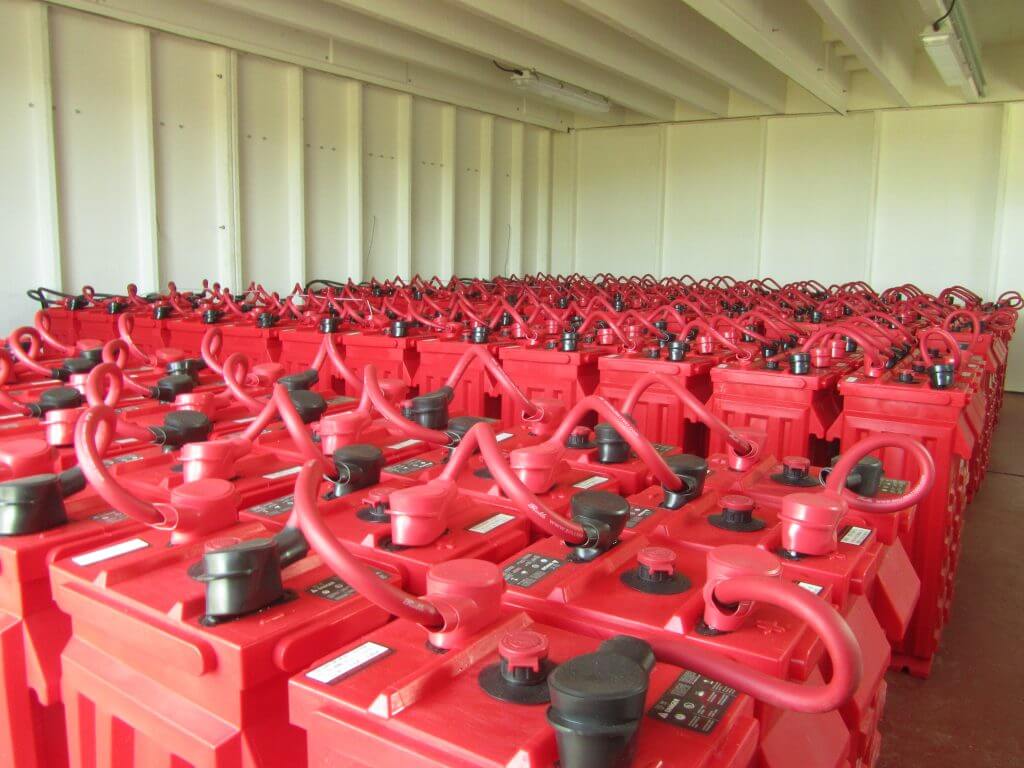
The International Energy Agency predicts that batteries will play an increasingly important role in providing a means for energy storage. Currently, only 1% of renewable energy is complemented by storage, but as countries across the globe continue moving towards greater decarbonization and electrification, advanced lead batteries are one of the technologies poised to meet this demand.
The Consortium is behind worldwide efforts to develop the latest innovation, to create longer-lasting, affordable and safe battery energy storage using advanced lead batteries. The research group is co-ordinating cutting-edge research projects in the United States and Europe.
With their specialty being deep cycle lead batteries, Surrette provides high-quality, dependable energy storage solutions for a range of applications from renewable energy and motive projects, to railroad and marine installations.
END
Notes to editors:
About CBI:
NEWS RELEASE
A global battery research group has joined forces with European battery manufacturers in a move designed to boost innovation in the technology and support decarbonisation.
The Consortium for Battery Innovation (CBI), a global research group developing advanced lead batteries has signed a memorandum of understanding with EUROBAT, the Brussels-based association representing Europe’s automotive and industrial battery manufacturers.
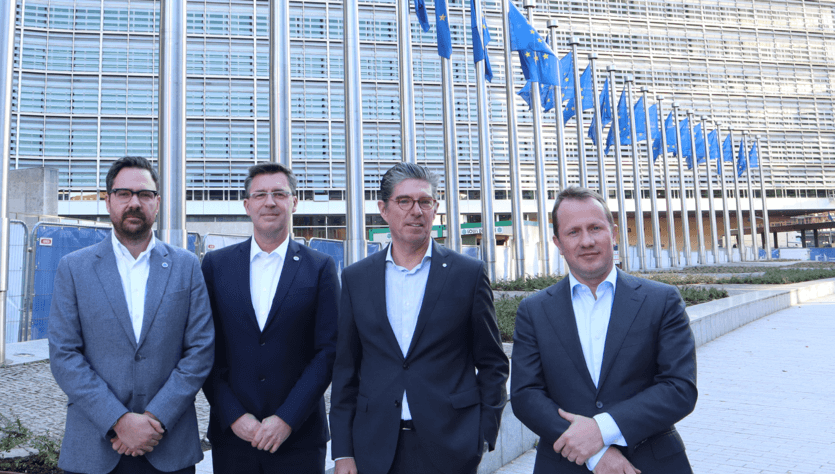
The move will help channel research and development into innovative battery energy storage systems which are critical to achieving the EU’s low carbon ambitions as part of a European Green Deal.
Dr Christian Rosenkranz, Vice President Industry and Governmental Relations, Clarios EMEA and EUROBAT Board member, said the partnership with the Consortium underpins industry’s commitment to develop advanced lead batteries. As Consortium Vice-Chairman, Dr Rosenkranz is at the forefront of leading the industry-research partnership focusing on innovation in lead batteries as one of the critical technologies which will underpin electrification and decarbonisation targets.
He said: “We need to create a strong battery ecosystem in Europe, supporting a range of technologies with different strengths. Lead batteries already represent over 70% of the world’s rechargeable battery energy storage in everything from the cars we drive to the back-up systems for mobile phone networks. This partnership will support our efforts to develop the next generation of advanced lead batteries.”
Dr Alistair Davidson, Consortium for Battery Innovation Director added: “We are conducting pioneering research into next generation batteries and we have a technical roadmap setting out the research which is already underway to develop advanced lead batteries for a range of different applications. Europe already has an established and successful lead battery industry and by working closely with manufacturers we can further enhance our research capability, to ensure we are developing and making the advanced batteries Europe needs to support its low carbon future.”
The EU’s lead battery value chain is committed to supporting research which underpins climate goals, while also delivering economic growth, supporting highly-skilled jobs and sealing in the EU’s intellectual leadership in key technologies. The Consortium works with its members to broker and commission cutting edge pre-competitive scientific research. Their work stimulates innovation and underpins advanced lead battery technology.
The Consortium and EUROBAT will develop research projects designed to make a tangible difference to lead battery performance, while meeting the demands of end-users such as the automotive industry, industrial, and utility and renewable energy storage companies. The partnership agreement also signifies the growing role of lead batteries in meeting electrification and decarbonisation targets across the globe.
Under the agreement, the Consortium for Battery Innovation and EUROBAT will:
EUROBAT has launched an information and awareness campaign called Charge the Future to highlight the key role lead batteries play in the European economy.
Ends
Notes to editors:
About Consortium for Battery Innovation:
About EUROBAT
DURHAM, NORTH CAROLINA – October 15, 2019 - Researchers have unveiled a program designed to produce high performance batteries in the United States (U.S.) for renewables energy storage and improved hybrid electric cars.
The Consortium for Battery Innovation (CBI) has published the program in an innovation roadmap for advanced lead batteries which sets out research priorities for the next three years.
U.S. members of the Consortium, which include battery manufacturers, universities and research institutes, are working together on pre-competitive research to fast-track innovation.
Q1 2019 saw 148.8 MW deployed by the U.S. energy storage market, a massive 232% increase from the same period last year. The Consortium anticipates this growth record to set an upward trend in demand for battery energy storage. The U.S. will need a range of battery technologies - including lithium and advanced lead batteries – if energy storage demand is to be met.
The Consortium expects to see growth in battery energy storage in four key sectors:
The plans outlined in the innovation roadmap will also help car-makers accelerate the roll out of start-stop and micro-hybrid vehicles, aiming to increase the dynamic charge acceptance of lead batteries by storing more of the energy created when a car brakes. More than 275 million cars and trucks in the U.S. utilize lead batteries.
And U.S. members of the Consortium aim to boost the lifetime of advanced lead batteries used to store energy generated by renewables by increasing cycle life and performance at partial state-of-charge. This would give them an increased cycle life of up to 5 times.
Dr. Alistair Davidson, director of the Consortium for Battery Innovation, said: “We’ve designed our research program to help meet rapidly growing demand for battery energy storage – from cars to renewable energy. That means designing longer-lasting batteries with more sophisticated technology. It’s important that we create the right conditions for battery manufacturers to innovate and expand in the U.S.”
Dr. Tim Ellis, president of RSR Technologies and chairman of CBI added: “There is no doubt that in the U.S. we will need to support a range of battery technologies to meet the needs of diverse products and applications. One of the great advantages of lead batteries is that we’re only now beginning to unlock the full potential of the technology.”
U.S. members of the Consortium include the leading players in the lead battery value chain, including battery manufacturers, lead producers, recyclers and industry suppliers. The Consortium also partners with prestigious research institutes and universities at the forefront of lead battery research such as the Department of Energy’s Argonne National Laboratory, UCLA and Missouri University of Science & Technology.
###
Notes to editors:
One of the founders of NorthStar Battery, Dr Frank Fleming, is the recipient of the 2019 International Lead Award at the 18th Asian Battery Conference (18ABC), recognising his outstanding lifetime contribution to the lead battery industry and his role inspiring new generations of lead battery innovators.
Dr Fleming’s career in the lead battery industry began as a sandwich-year student when he joined the UK-based battery manufacturer Chloride Technical Ltd.
During his career he served as Technical Director of Hawker Energy Products before becoming the company’s Global Director for Standby Development, overseeing the company’s products throughout Europe and the United States.
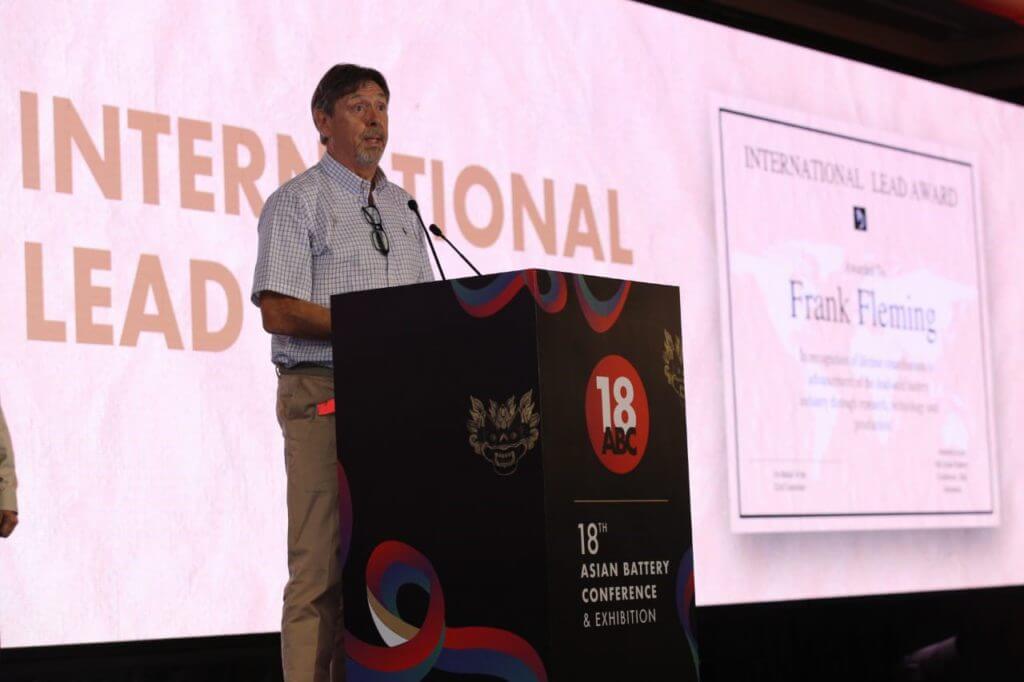
In 2000 he was one of the co-founders of NorthStar where for more than 16 years as Chief Technical Officer he oversaw design and quality assurance and the production of the company’s advanced lead batteries for telecommunications and uninterrupted power supplies.
Liverpool born Dr Fleming, 64, now works with Electric Applications Inc in Phoenix, Arizona, the hi-tech battery development and testing laboratory. In his role he provides consultancy, developing new business opportunities in advanced lead battery applications.
As a leading supporter and member of the Consortium for Battery Innovation he continues to demonstrate his passion for the industry through new research. He is currently responsible for the technical management of the lead battery consortium’s research being undertaken at the U.S government’s Argonne National Laboratory.
He said: “I’m very honoured to be recognised in this way. Working in this industry is like being part of a large worldwide family.
“I’m excited to still be contributing to an innovative industry which continues to push the boundaries of research and development. I think advanced lead batteries are key to the future of battery energy storage and electrification as the demand for safe and reliable battery storage is growing so rapidly. This has been recognised by the U.S government which is supporting our industry’s joint research programme through the national laboratories. As an industry we must recognise these opportunities and ensure our technology is part of the solution.”
“I also think young scientists and engineers can enjoy a great career in our industry because there is still so much to achieve in terms of the electro-chemistry and the technology. I hope this award will go some way to inspiring anyone considering a career in battery chemistries to join one of the many successful lead battery companies or research institutes.”
Commenting on the award, Don Karner, the President of EAI said: “Frank’s entire career has been spent advancing lead battery technology. His current work is on the cutting edge of lead battery science research. I congratulate Frank on his career of industry leadership and commend the ILA for recognizing Frank’s significant contributions to the lead battery industry.”
Each year the International Lead Award is presented to an individual who has made a major contribution in their working life to the lead or lead battery industries.
Ends
Note to editors:
1: For more information, or to speak to Dr Fleming, please contact:
2: A photograph of Dr Fleming is below:

DURHAM, NORTH CAROLINA (June 13, 2019) - PLANS to introduce lead battery-supported electric vehicle (EV) charging stations have moved a step closer thanks to funding through a competitive grant awarded by the U.S. state of Missouri, made possible by funds from the U.S. Department of Energy State Energy Program.
The competitive grant award by the state’s Division of Energy will support a Consortium for Battery Innovation (CBI) feasibility study that will investigate advanced lead battery energy storage deployed alongside EV charging points at Missouri gas stations.
The ground-breaking project could pave the way for a much wider roll-out of EV charging stations utilizing advanced lead battery technology.
CBI is now preparing to select the most appropriate gas station locations before conducting an in-depth feasibility analysis for at least two locations.
Dr. Alistair Davidson, CBI Director, said: “This project aims to demonstrate how advanced lead battery energy storage, linked to EV charging stations, can help manage electricity demand fluctuations and store electricity when it is less costly, before supplying it at a time when electric car drivers need to charge their vehicles. It highlights the important role lead batteries can play in assisting governments around the world to roll-out charging infrastructure and meet energy needs.
“This kind of innovation could result in a much faster and more effective roll-out of EV charging stations using tried and tested battery energy storage with lead batteries.”
The grant from Missouri will fund a detailed plan for the set-up and construction of EV charging stations with advanced lead storage at the selected demonstration sites. The detailed plans will identify potential funding sources to fully develop each site. These sites can then be used as a model for future lead battery-supported EV charging stations across the state.
CBI is aiming to establish the demonstration sites in the autumn of 2019. CBI is partnering with Paragon Business Solutions, Inc., a consultancy business located in Rolla, Missouri, to deliver the feasibility study.
Craig Redmon, Director of Missouri’s Division of Energy, said: “We are delighted to support this project through our innovative industry partnerships program, which aims to increase the awareness of, and experience with, marketable energy storage technologies that have the potential to contribute to meeting the state’s energy needs and economic development goals now and into the future.”
Ends
Note to editors:
About Consortium for Battery Innovation:
Two CBI members, Narada and Microporous, have been acknowledged as ‘honorable mentions’ by the judging committee at the U.S. annual Battery Council innovation awards.
Narada has partnered energy storage operator Upside Group in an innovative frequency regulation project, which represents the first large-scale application of lead-carbon batteries in grid-level frequency regulation energy storage systems.
The project was for the German power grid (see the CBI case study here) and the installation, at Langenreichenbach, has a planned construction capacity of 75MW. The installed capacity of the first phase of the project is 16.4MW, and the peak energy storage capacity can reach 25MWh. This project consists of 18 containers, and the battery consists of 10,584 units of 1200Ah lead-carbon valve regulated cells. It is powered by nine inverters, each of which can provide 1.8 MVA.
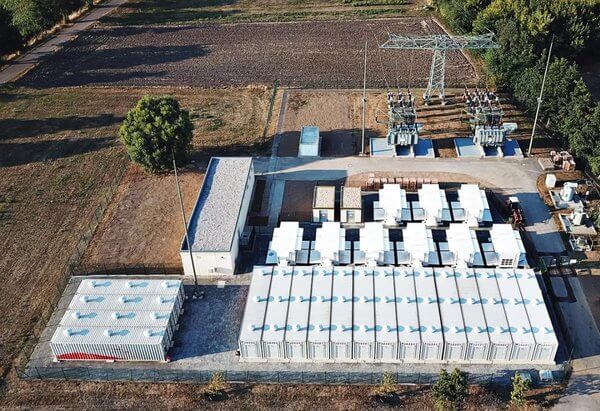
Narada was one of the pioneers in terms of developing lead-carbon battery systems in energy storage. The company says this project is the first investment and operation model project in the overseas market.
Narada chose Germany as a test location because its utilization of renewable energy is one of the most advanced in the world. Its power grid frequency regulation market is thus a mature power market auxiliary service trading market.
Narada’s project development team was responsible for the finance and development of the entire project. Narada will work with Upside to finish building the project, with a total investment of around €42 million ($47 million).
Meanwhile, the awards committee said that separator product developer Microporous’ innovation — a product known as the DCA Booster Mat — provides greater dynamic charge acceptance without needing any change for the negative active material in the battery.
The Booster Mat can be bundled with the firm’s SLI or industrial separators and is suitable for enhanced flooded batteries — meaning that it allows charge acceptance optimization in high rate partial state of charge requirements (such as in start-stop applications).
Microporous hopes to have completed prototype testing in the next 12 months. It will then develop partnerships with battery companies to evaluate and market the product.
Divya Tiwari, Technical Manager at Microporous, said the innovation offers excellent charge acceptance in industrial markets such as motive power, where opportunity charging is required.
CBI member RSR Technologies has won a prestigious award for the most important and innovative achievement in 2018 at the Battery Council International convention in the United States.
The award was given in recognition of the combination of RSR’s research into the fundamentals of lead battery charging and discharging and the resultant use of a ground-breaking alloy that can double cycle life and vastly reduce water loss.

RSR, working with East Penn Manufacturing and the US Argonne National Laboratory has been using Argonne’s Advanced Photon Source synchrotron to look at, in real time, the crystallization of lead plates at the atomic level during the charging and discharging process. The results of the research enabled the firm to develop its alloy known as Supersoft-Hycycle which enhances the lead battery performance.
CBI Chairman and president of RSR Technologies, Tim Ellis said: “This has been a tremendous opportunity to dramatically improve the performance of the active material in lead batteries to reach the full theoretical potential of the lead battery system.
“We can compete and win against other technologies in many applications with higher performance.
“The work at Argonne has helped us understand the physical processes taking place in real time inside batteries to develop higher performance advanced lead batteries. Our Supersoft-Hycycle lead really improves cycle life as validated by many of our customers, especially in higher temperature and extreme operating conditions.”
The alloy is already being used by South African battery firm Auto-X, the maker of the Willard brand of batteries.
Kelvin Naidoo, Willard’s Manufacturing and Technical Director earlier said the results were “spectacular and had shown vastly improved cycling and greatly reduced water loss — the holy grail for lead batteries… We are getting results that we can’t understand because we expect there to be a failure amount and we’re not getting one at all.
“In Africa with the high temperatures you expect grid corrosion and we’ve just tested some imported batteries in the field, which all failed. But this alloy is performing remarkably well.”
Naidoo says he expects the new material will prove to be a spectacular game changer for the lead battery industry.
Supersoft-Hycycle is undergoing trials with half a dozen companies in North America and Europe. Ellis says he anticipates that it will be fully available commercially by the end of the third quarter.
Lead battery-powered energy storage highlighted by research consortium’s online map
A digital map detailing more than 120 lead battery-powered energy storage projects has been unveiled by the Consortium for Battery Innovation (CBI).
The map, published online ahead of the Energy Storage Association’s annual conference held in Phoenix, Arizona, includes diverse case studies demonstrating successful lead battery energy storage installations from the United States, to Asia and Europe.
The feature is included on the Consortium for Battery Innovation’s website.

Through a range of case studies, the map details how lead battery storage is supporting utility and renewable energy systems. This includes providing back-up for local power grids and supplying off-grid electricity to power remote communities.
CBI Director Dr Alistair Davidson said: “We are seeing growing interest in lead battery energy storage for utility and renewables systems all over the world. The aim of this initiative is to highlight some of these installations and encourage companies to share other examples we can highlight demonstrating the variety of projects currently in place.”
“Our analysis suggests demand for battery energy storage will increase significantly in the next five years. This new tool will allow us to demonstrate that the latest lead battery technology is supporting a wide range of installations with reliable, safe, sustainable and cost-effective energy storage.
“A focus of CBI is to conduct pre-competitive research to support development of the next generation of lead batteries which will significantly extend both battery life and performance, to support diverse energy systems and electrification.”
ENDS
Note to editors:
Consortium website:
A global battery consortium charged with advancing lead battery technology has re-launched as it prepares to unveil a raft of new research designed to take the technology to the next level.
The Consortium for Battery Innovation, which includes more than 90 member companies worldwide supporting pre-competitive research into lead battery technology, is preparing for a surge in demand for energy storage in the next decade.
Since it was formed as the ALABC 25 years ago, the Consortium has ushered in major breakthroughs including start-stop batteries – the technology which allows car engines to stop and re-start, reducing CO2 emissions and boosting fuel economy.
Now, the Consortium for Battery Innovation has stepped-up its work by preparing a new technical roadmap designed to extend both the performance and lifetime of the core battery technology.
The program, which will be unveiled later this year, will fund projects designed to increase the cycle life of advanced lead batteries and further improve their ability to operate in applications such as start-stop and micro-hybrid applications. Other areas highlighted for future study include in-depth research into the addition of elements such as carbon aimed at extending both lifetime and performance.
One of the Consortium’s ground-breaking studies is already underway in the United States in partnership with the Argonne National Laboratory. It uses the laboratory’s synchrotron x-ray source to study the chemical changes occurring during charge and discharge reactions in real time, something not previously conducted with lead batteries.
Dr Alistair Davidson, Director of the Consortium for Battery Innovation, said: “I expect worldwide demand for energy storage to jump significantly in the next decade. In Europe alone demand is set to jump by up to 10 times by 2050. So advanced lead batteries will be critical to meeting that requirement, which is over and above existing uses such as start-stop batteries and back-up for mobile networks and emergency power.
“There are many factors driving this demand, including decarbonisation and electrification. Excitingly, lead batteries are now becoming more common as energy storage for renewables, such as solar and wind, as local grids and independent electricity systems come on line. Cost, recycling, safety and reliability, as well as performance, are all important factors for these systems, which play to the strengths of lead batteries.
“Overall there is of course an ever-present need for better performance and longer lifetime, so our next set of research priorities will amount to a big leap in the technology’s capability to help meet this surge in demand.
“The push for greater electrification requires a mix of battery technologies capable of delivering at scale. We are working with government research teams and universities in the US and Europe to develop the technology that will usher in the next generation of advanced lead batteries.”
The Consortium includes an advisory panel made up of global battery experts who help define, assess and guide research.
The Consortium for Battery Innovation’s first workshop this year, taking place in Shanghai, China on March 5 will discuss the new research program.
Note to editors:
Consortium website:
Advanced lead batteries are proving an effective energy storage and distribution option for projects including frequency regulation, wind and solar generated electricity and local energy grids, battery expert and Consortium for Battery Innovation adviser Dr Geoffrey May told delegates at the EASE energy storage global conference in Brussels.
Dr May, a Consulting Engineer who was Chief Technical Officer at FIAMM and Director of Technology at Invensys (now EnerSys) and Hawker Group, set out the advantages of using lead batteries, including their sustainability, performance, price competitiveness and reliability at the annual energy storage event.
He told delegates at the EASE conference that new developments in lead battery technology, including reduced sulphation are enhancing performance in shallow cycling.
In addition, Dr May highlighted the advantages of lead battery rechargeable storage including their low cost, full recyclability and the technology’s proven reliability together with a global service and support network.
By contrast, other technologies represented much higher cost, with poor sustainability credentials.
He said: “Rechargeable energy storage demand is set to grow significantly and as we seek more sustainable and reliable battery performance, advanced lead batteries are proven to work across a range of relevant applications and there are growing numbers of high-performing examples of lead battery storage solutions.
“Advanced lead batteries offer high cycle life and battery options include flooded and VRLA designs together with specialist designs for higher energy density.”He added that lead is the most efficiently recycled commodity metal, with 99% of batteries in Europe collected and recycled at end-of-life, including containers and covers, making them a perfect example of the circular economy in action. The recycling industry operates without subsidy in full compliance with environmental regulations.
-In a new scientific paper published by the Journal of Energy Storage, battery scientists have reviewed the impact of adding supplementary carbon to the negative plate of lead batteries to demonstrate how to
-Visit our energy storage page to see case studies of global energy storage projects supported by lead batteries.
About CBI
For more than 25 years, the Consortium for Battery Innovation has delivered cutting-edge research taking lead batteries to a new level. With an expert panel made up of the world’s leading battery manufacturers and research specialists, the Consortium is setting the standard for advanced lead batteries and the next generation of energy storage.
Our members are drawn from battery manufacturers and lead producers worldwide, all with a common aim to inspire the latest research to help design and produce technology for advanced lead batteries.
For more information:
Media office:
Hywel Jarman hywel.jarman@batteryinnovation.org Tel: +44 (0) 207 833 8090; +44 (0) 7718 483887
Niamh McLaughlin niamh.mclaughlin@batteryinnovation.org Tel: +44 (0) 207 833 8090
Industry–national lab collaboration seeks unrealized potential of a venerable battery technology
The complex interactions inside a lead battery while it charges and discharges remain mysterious, even 159 years after the technology’s invention. But now the lead battery is headed for a high-tech makeover that will make this sustainable mainstay product more appealing to the automotive industry and the power grid.
Under the terms of a new agreement signed with the U.S. Department of Energy’s Argonne National Laboratory, 14 members of the Consortium for Battery Innovation have joined forces with Electric Applications to grapple with some of their common challenges.
“This is a beautiful example of how synergy between industry and science can drive innovation,” said Venkat Srinivasan, director of the Argonne Collaborative Center for Energy Storage Science (ACCESS). “These leading companies of the lead battery industry want to do pre-competitive R&D using some of the most advanced tools, techniques and capabilities at Argonne to help improve the longevity of lead batteries. Every company faces this problem. Once you understand the complex chemical interactions inside these batteries, you can start to propose solutions to further extend their life.”
The research will be a collaborative effort between Argonne’s Advanced Photon Source (APS), and the laboratory’s Chemical Sciences and Engineering and Materials Science divisions. The APS is a DOE Office of Science User Facility that provides ultra-bright, high-energy X-ray beams for research in almost all scientific disciplines.
Tim Fister, an Argonne materials scientist in the Chemical Sciences and Engineering division, will be using the state-of-the-art tools at the APS to understand the changes in the battery during its operation. Argonne’s Materials Science division operates the Electrochemistry Discovery Laboratory, where a team of experts led by Vojislav Stamenkovic, senior scientist and tech leader, will explore the behavior of materials at the atomic scale to reveal the structure-function relationships responsible for lead battery operation.
“We’ve developed so many tools and techniques in the last five years, and we now have a chance to understand how we can unlock the potential for the next generation of batteries. We can see things that we couldn’t have seen even 10 years ago,” Srinivasan said.
The nine guiding members of the program include Crown Battery Manufacturing Company, Doe Run Resources Corporation, East Penn Manufacturing Company, EnerSys, Exide Technologies, Johnson Controls, NorthStar Battery Company, RSR Technologies and Trojan Battery Company. Additional members include Superior Graphite, Microporous LLC, Cabot Corporation, Borregard Lignotech and Advanced Battery Concepts.
“There is a need, and the resources are available at Argonne and industry is willing to invest in advanced technology,” said Don Karner, president of Electric Applications Incorporated of Phoenix and the program manager for the companies. “Bringing all three of those elements together, we’re hoping to gain significant knowledge that will help the members significantly improve the performance of their battery products. The science program will focus Argonne’s resources and expertise on improving the performance of lead batteries to assist the industry in meeting market demands for existing applications and for new applications.”
To date, Argonne has focused much of its attention on lithium-ion and beyond-lithium-ion batteries. Its researchers have blended different chemical elements in an effort to squeeze more energy out of the lithium-ion system. But the expertise and techniques that Argonne has tapped also apply to lead batteries, Karner said. He sees Argonne and the other members as a special breed of explorers and miners.
Tim Ellis, Chairman of CBI, and President of RSR Technologies said, “Lead batteries are a critical foundation technology underpinning everything from the cars we drive to the cell phone networks they back up. This new project, with Argonne’s scientists, will help make the leap to the next generation of advanced lead batteries, as well as supporting efforts to meet the growing demand for reliable, safe and effective rechargeable battery energy storage. This is cutting edge research employing techniques not previously utilized for lead batteries, and we are confident the results will prove ground-breaking.”
Argonne and the consortium members seek to build upon the work of their predecessors. For the last century, lead battery manufacturers have invested much of their research in assessing the viability of processing methods and additives without fully understanding the underlying chemistry. “We will provide a better understanding of this technology through fundamental electrochemistry and through high precision, custom built tools,” Stamenkovic said.
“We are particularly interested in the lead sulfate crystal growth and dissolution process, and in learning how to control the latter in a more effective manner,” Fister said. The lead sulfation issue limits lead battery performance to less than half its potential. Tapping a significant portion of that unused potential would result in even better low-cost, recyclable batteries for mobile and stationary market applications.
Once Argonne researchers better understand these processes, they will begin analyzing how the addition of various additives may improve lead battery performance, much as they have done with lithium-ion batteries.
About Argonne
Argonne National Laboratory seeks solutions to pressing national problems in science and technology. The nation’s first national laboratory, Argonne conducts leading-edge basic and applied scientific research in virtually every scientific discipline. Argonne researchers work closely with researchers from hundreds of companies, universities, and federal, state and municipal agencies to help them solve their specific problems, advance America’s scientific leadership and prepare the nation for a better future. With employees from more than 60 nations, Argonne is managed by UChicago Argonne, LLC for the U.S. Department of Energy’s Office of Science.
The U.S. Department of Energy’s Office of Science is the single largest supporter of basic research in the physical sciences in the United States and is working to address some of the most pressing challenges of our time. For more information, visit the Office of Science website.
About CBI
For more than 25 years, the Consortium for Battery Innovation has delivered cutting-edge research taking lead batteries to a new level. With an expert panel made up of the world’s leading battery manufacturers and research specialists, the Consortium is setting the standard for advanced lead batteries and the next generation of energy storage.
Our members are drawn from battery manufacturers and lead producers worldwide, all with a common aim to inspire the latest research to help design and produce technology for advanced lead batteries.
For more information:
Argonne Contact:
Ben Schiltz bschiltz@anl.gov Tel:
+1 630-252-5640
CBI Contact:
Hywel Jarman hywel.jarman@batteryinnovation.org Tel: +44 (0) 207 833 8090; +44 (0) 7718 483887
Niamh McLaughlin niamh.mclaughlin@batteryinnovation.org Tel: +44 (0) 207 833 8090
Fact sheets:
Click here to view the project fact sheet.
Click here to view the project technical summary.
Photographs


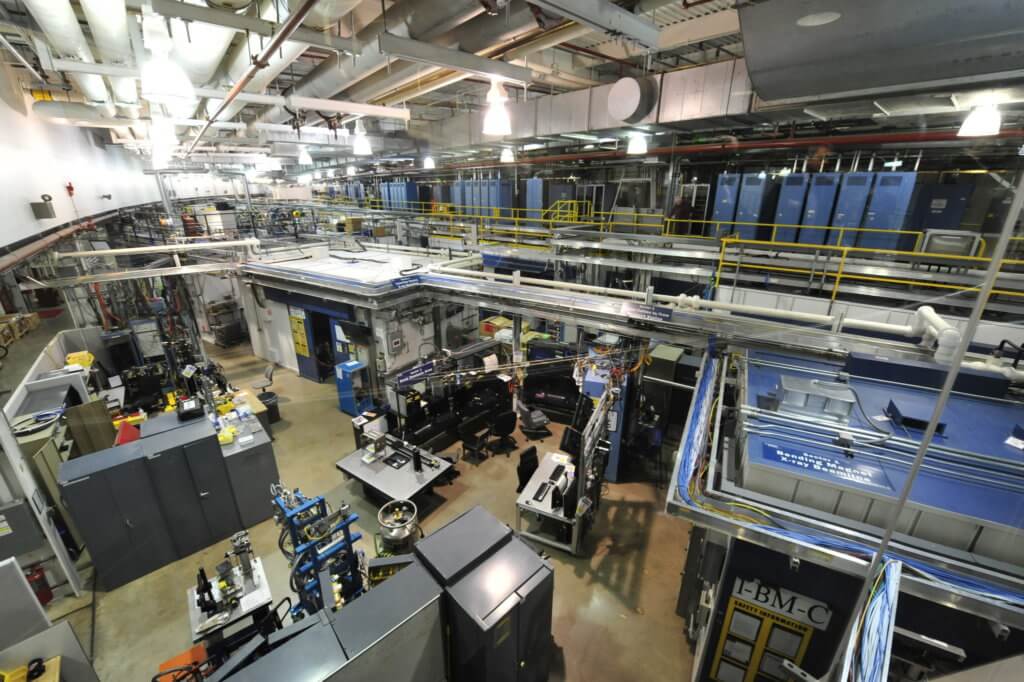
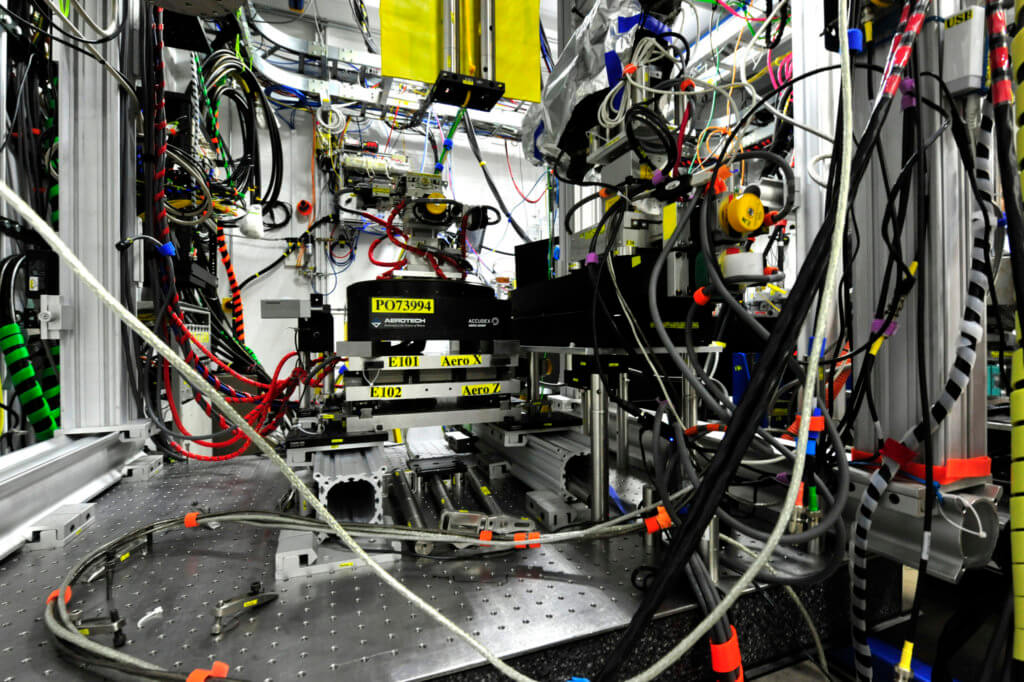

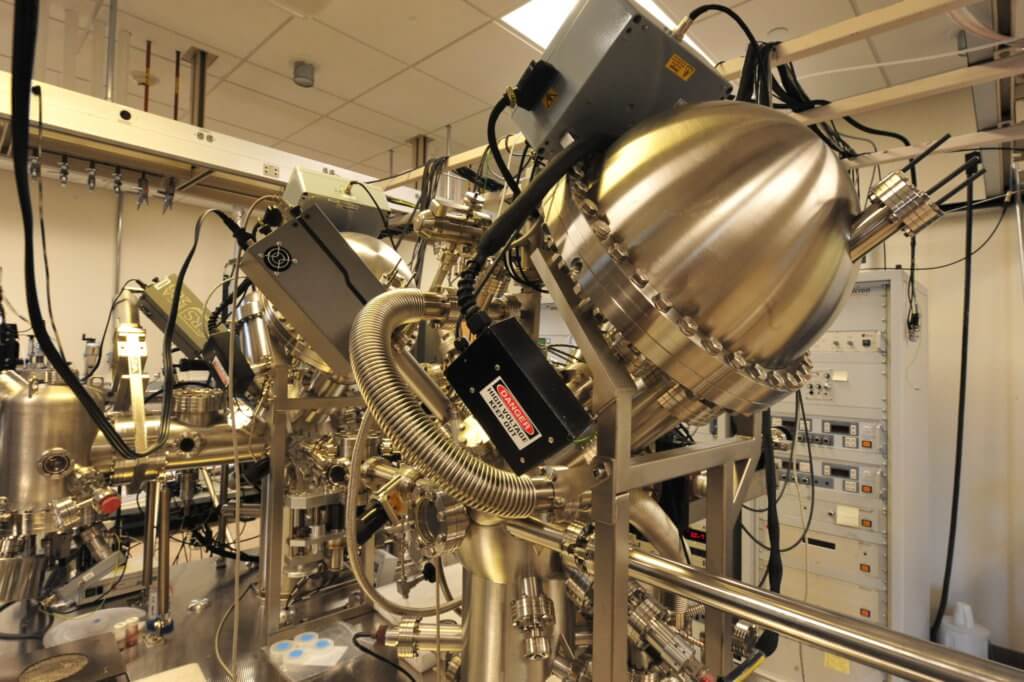
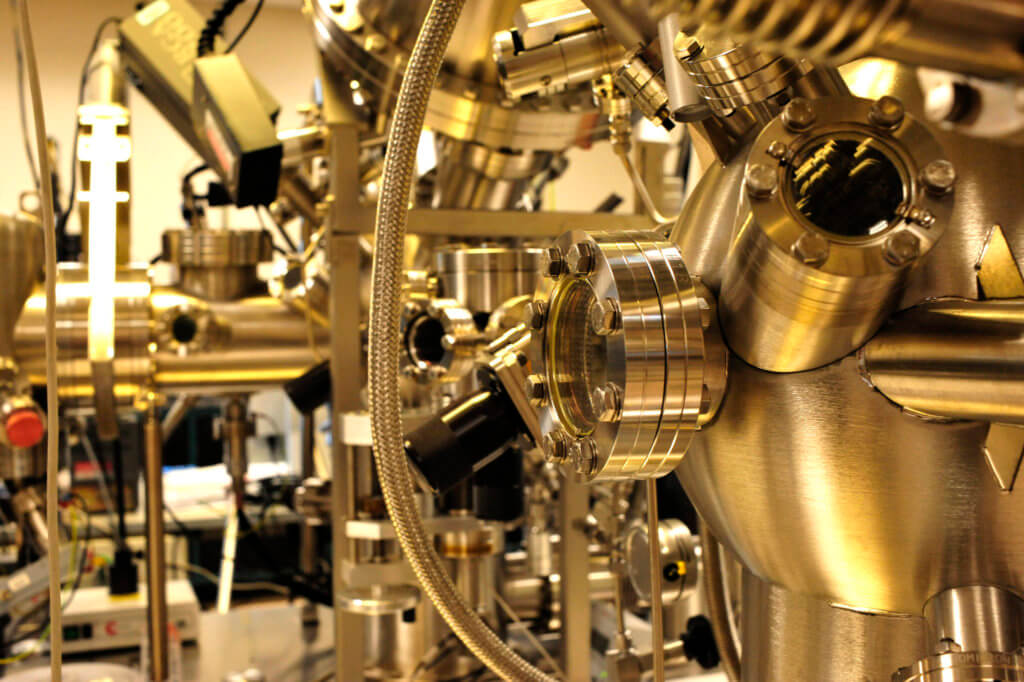
A global research consortium developing advanced lead batteries has joined the European association promoting energy storage.
The Consortium for Battery Innovation, which conducts pre-competitive research aimed at improving lead battery technology is now a member of EASE, the European Association for the Storage of Energy.
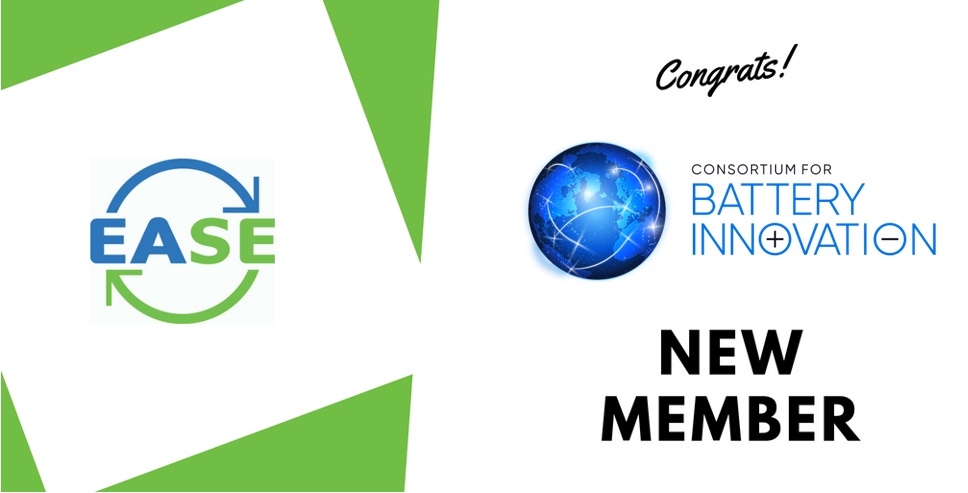
Dr Alistair Davidson, CBI Director, said energy storage is one of the key enablers of decarbonisation and electrification in Europe.
He said: “There are many forms of energy storage, and advanced lead batteries are already providing more than 75% of worldwide rechargeable battery storage. It is clear that the market for renewables energy storage is set to grow substantially and our members are establishing grid-level and micro-grid electricity storage systems using advanced lead batteries worldwide so we’re able to bring relevant experience to the debate.”
The Secretary General of EASE, Patrick Clerens, said: “We welcome CBI into membership as part of our aim to support a sustainable energy landscape for Europe. Their research experience and understanding of the global rechargeable battery market brings welcome expertise to our association.”